Here are my favorite poems about nostalgia categorized:
- Short poems about nostalgia
- Famous poems about nostalgia
- Poems about nostalgic love
- Nostalgia poems about childhood
So if you want the best poems about nostalgia, then you’re in the right place.
Let’s jump right in!
- 57 Joyful Poems About Gratefulness
- 53 Enchanting Poems About Peace
- 47 Endearing Poems About Acceptance
- 25 Soothing Poems About Calmness
- 69 Euphoric Poems About Happiness
- 67 Heartening Poems About Hope
- 43 Invigorating Poems About Smiles
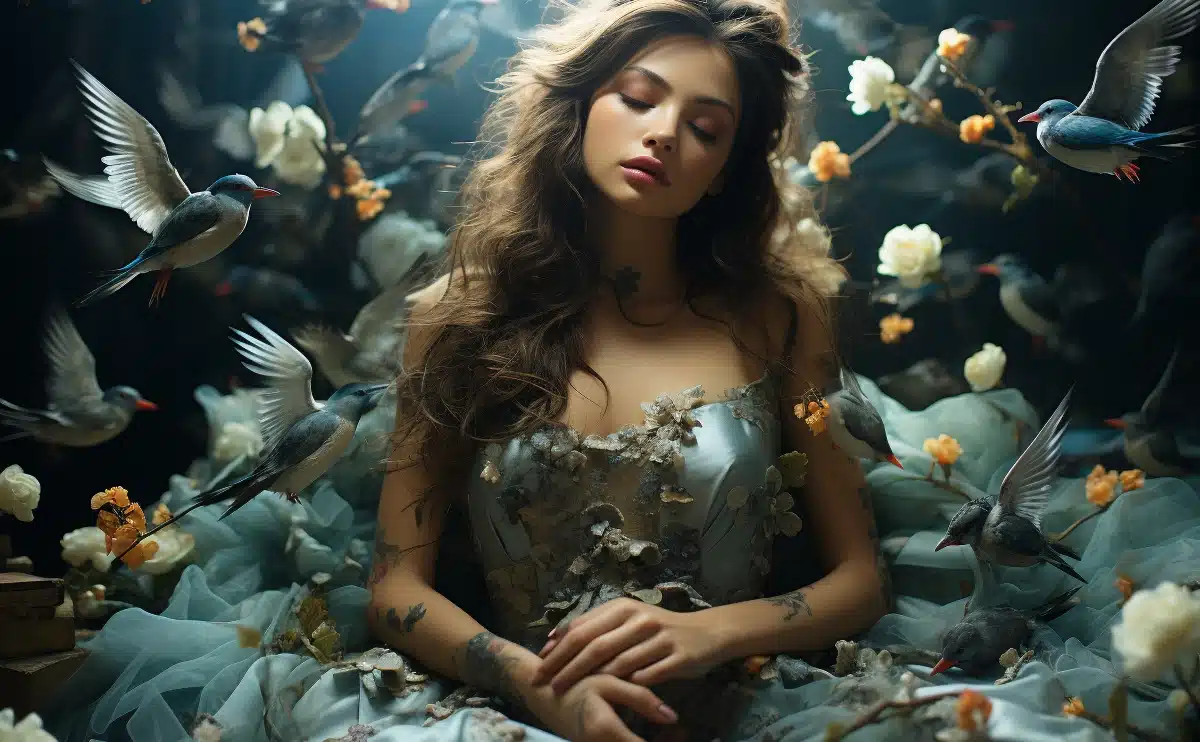
Bittersweet Poems About Nostalgia
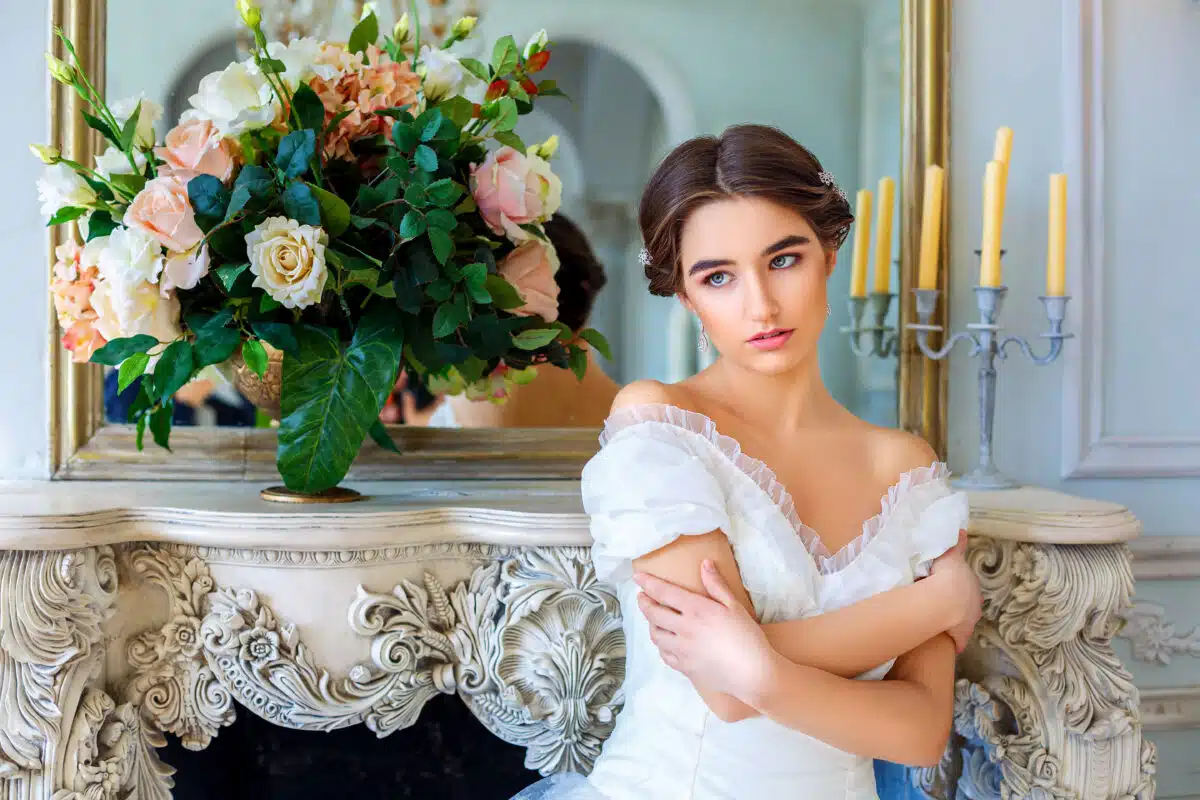
Unlock the doors to the past with our thought-provoking collection and let your most cherished memories welcome you with a warm embrace.
Hear the whispers from your past with compact and magical poems that will surely turn back the clock and leave you reminiscent of familiar feelings.
This heart-tugging collection will weave its nostalgic magic around you as it pulls you back to childhood’s simpler times and sweeter smiles.
Awaken the memories you thought were long forgotten with our emotion-packed selection, and let the past intertwine with your soul all over again.
Ready to walk down the memory lane?
Let the reminiscing begin!
My #1 Favorite Poem About Nostalgia
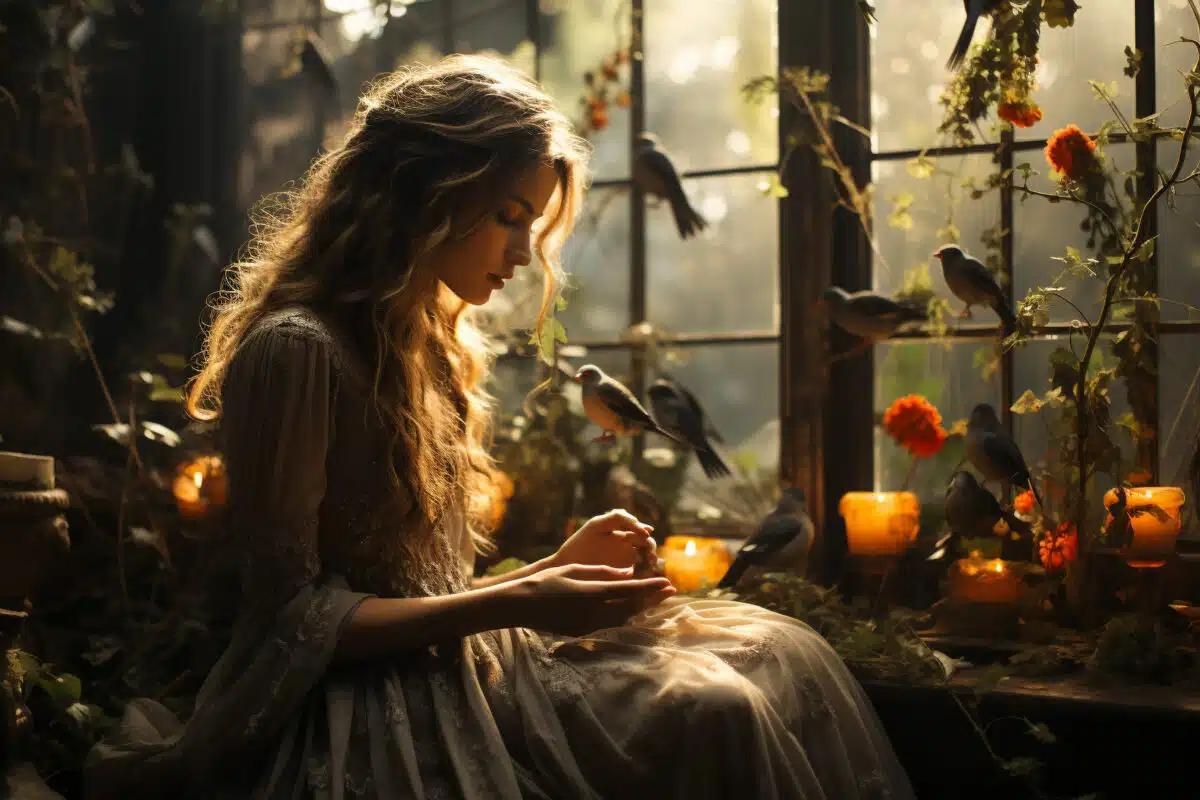
“I Remember, I Remember” by Thomas Hood
I remember, I remember,
The house where I was born,
The little window where the sun
Came peeping in at morn;
He never came a wink too soon,
Nor brought too long a day,
But now, I often wish the night
Had borne my breath away!
I remember, I remember,
The roses, red and white,
The violets, and the lily-cups,
Those flowers made of light!
The lilacs where the robin built,
And where my brother set
The laburnum on his birthday, –
The tree is living yet!
I remember, I remember,
Where I was used to swing,
And thought the air must rush as fresh
To swallows on the wing;
My spirit flew in feathers then,
That is so heavy now,
And summer pools could hardly cool
The fever on my brow!
I remember, I remember,
The fir trees dark and high;
I used to think their slender tops
Were close against the sky:
It was a childish ignorance,
But now ’tis little joy
To know I’m farther off from Heav’n
Than when I was a boy.
Why Is “I Remember, I Remember” My Favorite Poem About Nostalgia
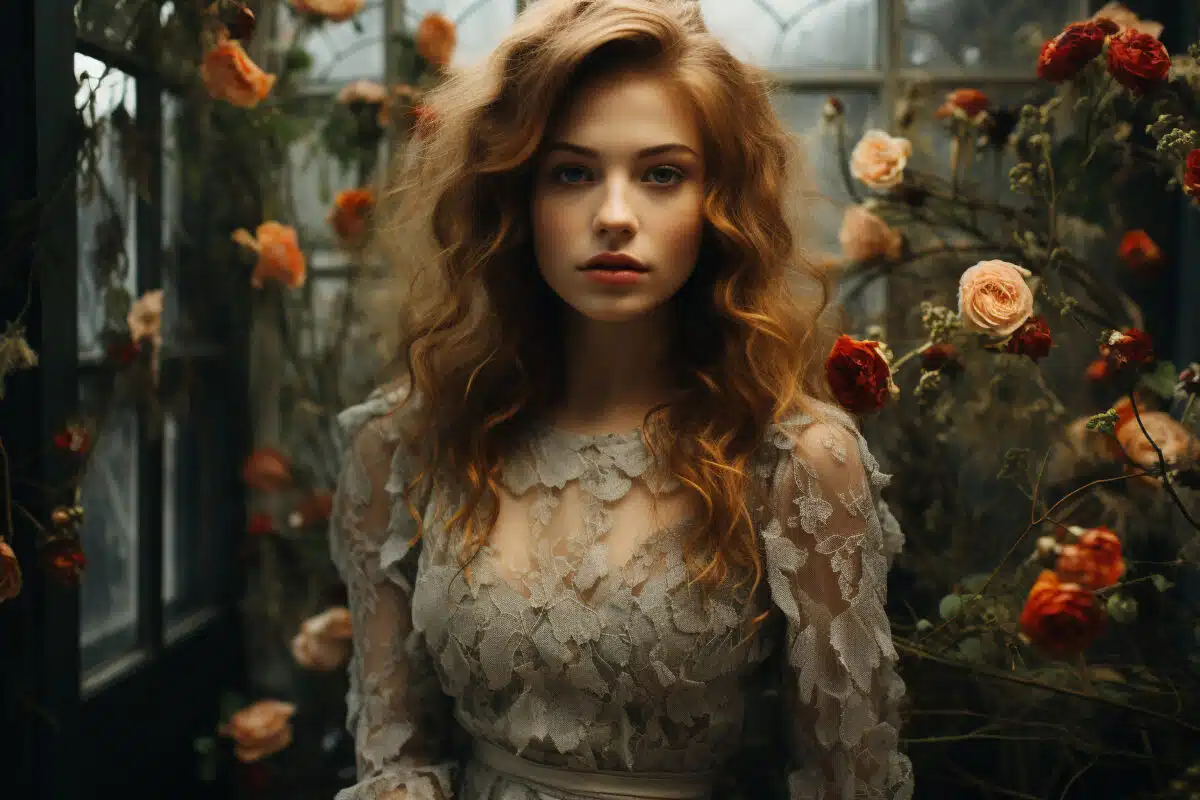
It’s amazing how a song, a place, or even the smell of food has the magic of whisking us back to the past, you know, the simpler times.
Reading the poem “I Remember, I Remember” by Thomas Hood instantly made me feel that way, making it the most favorite of mine.
It made me relive playing childhood games or savoring mom’s home-cooked meals while swinging my legs that weren’t even long enough to reach the floor.
In any version of myself, going down memory lane is truly a bittersweet ride that will either make me blush or shed a tear or two.
For me, this poem brings back the thought that although nothing seems to change day by day but when you look back nothing’s really the same anymore.
Short Poems About Nostalgia
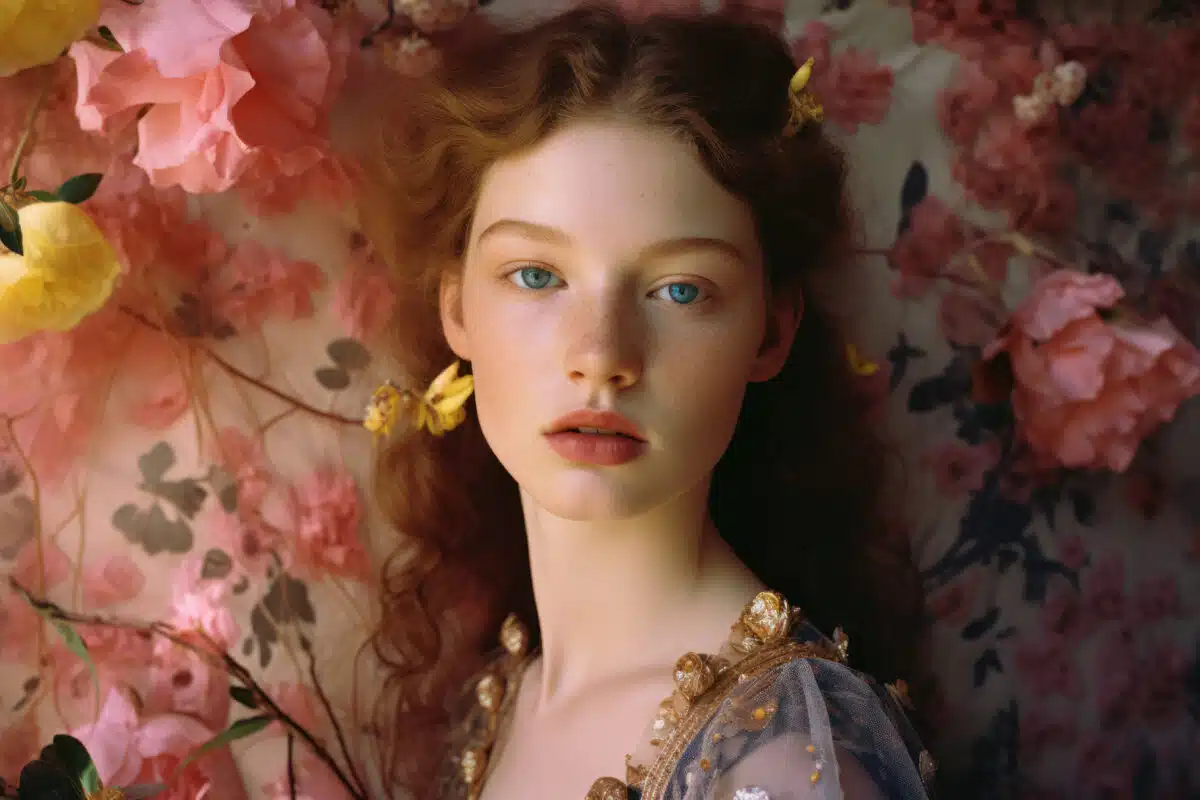
Like a time capsule, these short poems about nostalgia will capture the stirring essence of moments gone by with just a few verses.
Relish the ride to the most worth-remembering moments of your past and experience the power of sentiment and reminiscing through these touching poems.
“Memory” by W.B. Yeats
One had a lovely face,
And two or three had charm,
But charm and face were in vain
Because the mountain grass
Cannot but keep the form
Where the mountain hare has lain.
“I Shall Return” by Claude McKay
I shall return again; I shall return
To laugh and love and watch with wonder-eyes
At golden noon the forest fires burn,
Wafting their blue-black smoke to sapphire skies.
I shall return to loiter by the streams
That bathe the brown blades of the bending grasses,
And realize once more my thousand dreams
Of waters rushing down the mountain passes.
I shall return to hear the fiddle and fife
Of village dances, dear delicious tunes
That stir the hidden depths of native life,
Stray melodies of dim remembered runes.
I shall return, I shall return again,
To ease my mind of long, long years of pain.
“Once A Great Love” by Yehuda Amichai
Once a great love cut my life in two.
The first part goes on twisting
at some other place like a snake cut in two.
The passing years have calmed me
and brought healing to my heart and rest to my eyes.
And I’m like someone standing in the Judean desert, looking at a sign:
“Sea Level”
He cannot see the sea, but he knows.
Thus I remember your face everywhere
at your “face Level.”
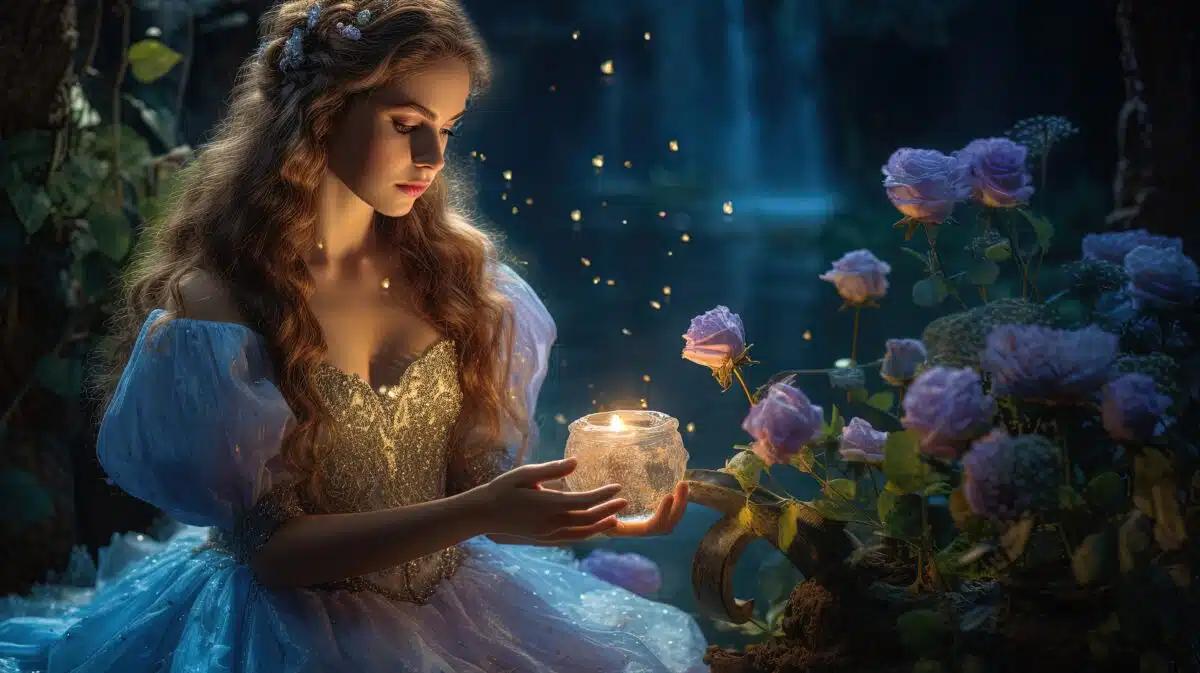
“For the Candlelight” by Angelina Weld Grimké
The sky was blue, so blue that day
And each daisy white, so white,
O, I knew that no more could rains fall grey
And night again be night.
. . . . .
I knew, I knew. Well, if night is night,
And the grey skies greyly cry,
I have in a book for the candle light,
A daisy dead and dry.
“Moon Tonight” by Gwendolyn Bennett
Moon tonight,
Beloved . . .
When twilight
Has gathered together
The ends
Of her soft robe
And the last bird-call
Has died.
Moon tonight—
Cool as a forgotten dream,
Dearer than lost twilights
Among trees where birds sing
No more.
“Mongan thinks of his past Greatness” by W.B. Yeats
I have drunk ale from the Country of the Young
And weep because I know all things now:
I have been a hazel tree and they hung
The Pilot Star and the Crooked Plough
Among my leaves in times out of mind:
I became a rush that horses tread:
I became a man, a hater of the wind,
Knowing one, out of all things, alone, that his head
Would not lie on the breast or his lips on the hair
Of the woman that he loves, until he dies;
Although the rushes and the fowl of the air
Cry of his love with their pitiful cries.
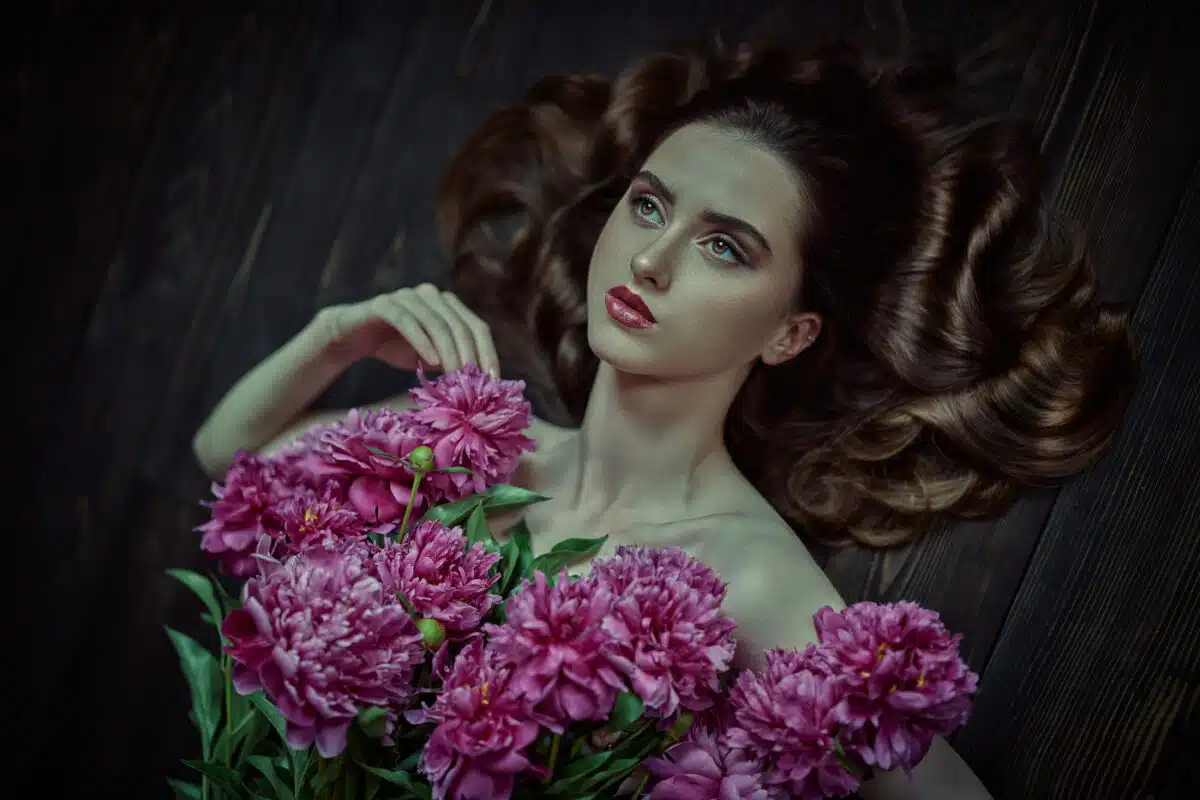
“Shade” by Anna Akhmatova
“What does a certain woman know of the hour of her death?” – Mandelstam
Tallest, suavest of us, why Memory,
forcing you to appear from the past, pass
down a train, swaying, to find me
clear profiled through the window-glass?
Angel or bird? How we debated!
The poet thought you like translucent straw.
Through dark lashes, your eyes, Georgian,
looking, with gentleness, on it all.
Shade, forgive. Blue skies, Flaubert,
Insomnia, late-blooming lilac flower,
bring you, and the magnificence of the year,
nineteen-thirteen, to mind, and your
unclouded temperate afternoon, memory
difficult for me now ‘ Oh, shade!
“Forgetting Someone” by Yehuda Amichai
Forgetting someone is like forgetting to turn off the light
in the backyard so it stays lit all the next day
But then it is the light that makes you remember.
“Remember” by Christina Georgina Rossetti
Remember me when I am gone away,
Gone far away into the silent land;
When you can no more hold me by the hand,
Nor I half turn to go yet turning stay.
Remember me when no more day by day
You tell me of our future that you planned:
Only remember me; you understand
It will be late to counsel then or pray.
Yet if you should forget me for a while
And afterwards remember, do not grieve:
For if the darkness and corruption leave
A vestige of the thoughts that once I had,
Better by far you should forget and smile
Than that you should remember and be sad.
Famous Poems About Nostalgia
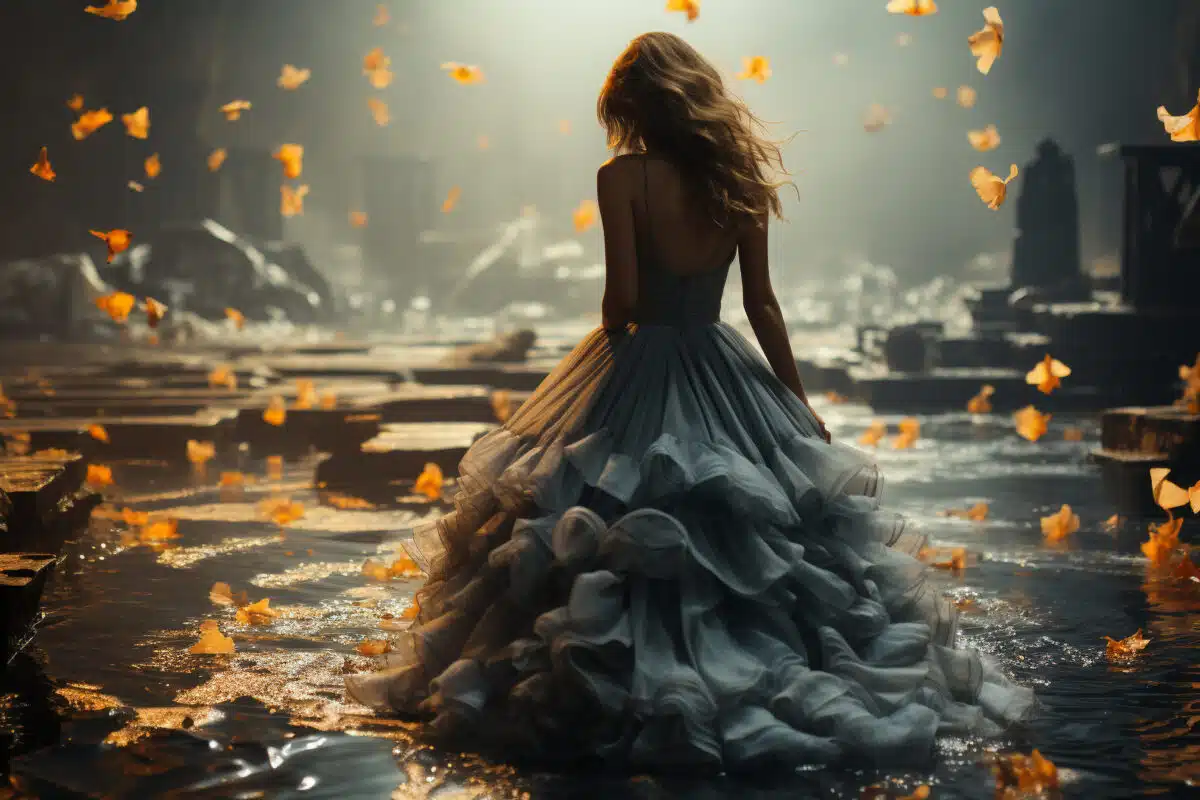
Enter the realm of timeless emotions with our precious collection of famous poems about nostalgia.
From the echoes of lost love to the yearning for bygone days, these renowned verses will take you on a poignant journey through the sweet ache of yearning for yesterdays.
“The Road Not Taken” by Robert Frost
Two roads diverged in a yellow wood,
And sorry I could not travel both
And be one traveler, long I stood
And looked down one as far as I could
To where it bent in the undergrowth;
Then took the other, as just as fair,
And having perhaps the better claim,
Because it was grassy and wanted wear;
Though as for that the passing there
Had worn them really about the same,
And both that morning equally lay
In leaves no step had trodden black.
Oh, I kept the first for another day!
Yet knowing how way leads on to way,
I doubted if I should ever come back.
I shall be telling this with a sigh
Somewhere ages and ages hence:
Two roads diverged in a wood, and I—
I took the one less traveled by,
And that has made all the difference.
“Speakin’ O’ Christmas” by Paul Laurence Dunbar
Breezes blowin’ middlin’ brisk,
Snow-flakes thro’ the air a-whisk,
Fallin’ kind o’ soft an’ light,
Not enough to make things white,
But jest sorter siftin’ down
So ’s to cover up the brown
Of the dark world’s rugged ways
’N’ make things look like holidays.
Not smoothed over, but jest specked,
Sorter strainin’ fur effect,
An’ not quite a-gittin’ through
What it started in to do.
Mercy sakes! it does seem queer
Christmas day is ’most nigh here.
Somehow it don’t seem to me
Christmas like it used to be,—
Christmas with its ice an’ snow,
Christmas of the long ago.
You could feel its stir an’ hum
Weeks an’ weeks before it come;
Somethin’ in the atmosphere
Told you when the day was near,
Did n’t need no almanacs;
That was one o’ Nature’s fac’s.
Every cottage decked out gay—
Cedar wreaths an’ holly spray—
An’ the stores, how they were drest,
Tinsel tell you could n’t rest;
Every winder fixed up pat,
Candy canes, an’ things like that;
Noah’s arks, an’ guns, an’ dolls,
An’ all kinds o’ fol-de-rols.
Then with frosty bells a-chime,
Slidin’ down the hills o’ time,
Right amidst the fun an’ din
Christmas come a-bustlin’ in,
Raised his cheery voice to call
Out a welcome to us all;
Hale and hearty, strong an’ bluff,
That was Christmas, sure enough.
Snow knee-deep an’ coastin’ fine,
Frozen mill-ponds all ashine,
Seemin’ jest to lay in wait,
Beggin’ you to come an’ skate.
An’ you’d git your gal an’ go
Stumpin’ cheerily thro’ the snow,
Feelin’ pleased an’ skeert an’ warm
’Cause she had a-holt yore arm.
Why, when Christmas come in, we
Spent the whole glad day in glee,
Havin’ fun an’ feastin’ high
An’ some courtin’ on the sly.
Burstin’ in some neighbor’s door
An’ then suddenly, before
He could give his voice a lift,
Yellin’ at him, “Christmas gift.”
Now sich things are never heard,
“Merry Christmas” is the word.
But it’s only change o’ name,
An’ means givin’ jest the same.
There’s too many new-styled ways
Now about the holidays.
I’d jest like once more to see
Christmas like it used to be!
“The Hills of Sewanee” by George Marion McClellan
Sewanee Hills of dear delight,
Prompting my dreams that used to be,
I know you are waiting me still to-night
By the Unika Range of Tennessee.
The blinking stars in endless space,
The broad moonlight and silvery gleams,
To-night caress your wind-swept face,
And fold you in a thousand dreams.
Your far outlines, less seen than felt,
Which wind with hill propensities,
In moonlight dreams I see you melt
Away in vague immensities.
And, far away, I still can feel
Your mystery that ever speaks
Of vanished things, as shadows steal
Across your breast and rugged peaks.
O, dear blue hills, that lie apart,
And wait so patiently down there,
Your peace takes hold upon my heart
And makes its burden less to bear.
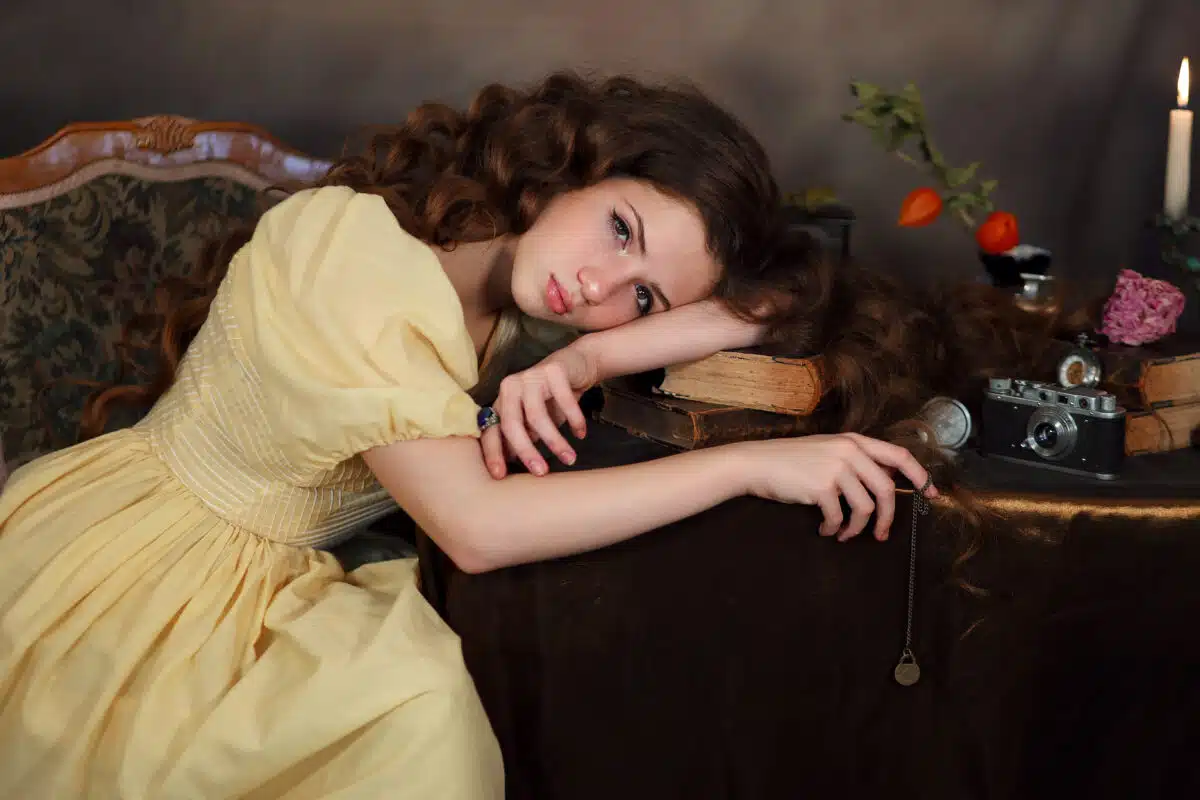
“When We Two Parted” by George Gordon Byron
When we two parted
In silence and tears,
Half broken-hearted
To sever for years,
Pale grew thy cheek and cold,
Colder thy kiss;
Truly that hour foretold
Sorrow to this.
The dew of the morning
Sunk chill on my brow—
It felt like the warning
Of what I feel now.
Thy vows are all broken,
And light is thy fame;
I hear thy name spoken,
And share in its shame.
They name thee before me,
A knell to mine ear;
A shudder comes o’er me—
Why wert thou so dear?
They know not I knew thee,
Who knew thee too well—
Long, long shall I rue thee,
Too deeply to tell.
In secret we met—
In silence I grieve,
That thy heart could forget,
Thy spirit deceive.
If I should meet thee
After long years,
How should I greet thee?—
With silence and tears.
“Annabel Lee” by Edgar Allan Poe
It was many and many a year ago,
In a kingdom by the sea,
That a maiden there lived whom you may know
By the name of Annabel Lee;
And this maiden she lived with no other thought
Than to love and be loved by me.
I was a child and she was a child,
In this kingdom by the sea:
But we loved with a love that was more than love—
I and my Annabel Lee;
With a love that the winged seraphs of heaven
Coveted her and me.
And this was the reason that, long ago,
In this kingdom by the sea,
A wind blew out of a cloud, chilling
My beautiful Annabel Lee;
So that her highborn kinsman came
And bore her away from me,
To shut her up in a sepulchre
In this kingdom by the sea.
The angels, not half so happy in heaven,
Went envying her and me—
Yes!—that was the reason (as all men know,
In this kingdom by the sea)
That the wind came out of the cloud by night,
Chilling and killing my Annabel Lee.
But our love it was stronger by far than the love
Of those who were older than we—
Of many far wiser than we—
And neither the angels in heaven above,
Nor the demons down under the sea,
Can ever dissever my soul from the soul
Of the beautiful Annabel Lee:
For the moon never beams, without bringing me dreams
Of the beautiful Annabel Lee;
And the stars never rise, but I feel the bright eyes
Of the beautiful Annabel Lee;
And so, all the night-tide, I lie down by the side
Of my darling—my darling—my life and my bride,
In her sepulchre there by the sea,
In her tomb by the sounding sea.
“Lines Composed A Few Miles Above Tintern Abbey” by William Wordsworth
Five years have past; five summers, with the length
Of five long winters! and again I hear
These waters, rolling from their mountain-springs
With a soft inland murmur.—Once again
Do I behold these steep and lofty cliffs,
That on a wild secluded scene impress
Thoughts of more deep seclusion; and connect
The landscape with the quiet of the sky.
The day is come when I again repose
Here, under this dark sycamore, and view
These plots of cottage-ground, these orchard-tufts,
Which at this season, with their unripe fruits,
Are clad in one green hue, and lose themselves
‘Mid groves and copses. Once again I see
These hedge-rows, hardly hedge-rows, little lines
Of sportive wood run wild: these pastoral farms,
Green to the very door; and wreaths of smoke
Sent up, in silence, from among the trees!
With some uncertain notice, as might seem
Of vagrant dwellers in the houseless woods,
Or of some Hermit’s cave, where by his fire
The Hermit sits alone.
These beauteous forms,
Through a long absence, have not been to me
As is a landscape to a blind man’s eye:
But oft, in lonely rooms, and ‘mid the din
Of towns and cities, I have owed to them
In hours of weariness, sensations sweet,
Felt in the blood, and felt along the heart;
And passing even into my purer mind,
With tranquil restoration:—feelings too
Of unremembered pleasure: such, perhaps,
As have no slight or trivial influence
On that best portion of a good man’s life,
His little, nameless, unremembered, acts
Of kindness and of love. Nor less, I trust,
To them I may have owed another gift,
Of aspect more sublime; that blessed mood,
In which the burthen of the mystery,
In which the heavy and the weary weight
Of all this unintelligible world,
Is lightened:—that serene and blessed mood,
In which the affections gently lead us on,—
Until, the breath of this corporeal frame
And even the motion of our human blood
Almost suspended, we are laid asleep
In body, and become a living soul:
While with an eye made quiet by the power
Of harmony, and the deep power of joy,
We see into the life of things.
If this
Be but a vain belief, yet, oh! how oft—
In darkness and amid the many shapes
Of joyless daylight; when the fretful stir
Unprofitable, and the fever of the world,
Have hung upon the beatings of my heart—
How oft, in spirit, have I turned to thee,
O sylvan Wye! thou wanderer thro’ the woods,
How often has my spirit turned to thee!
And now, with gleams of half-extinguished thought,
With many recognitions dim and faint,
And somewhat of a sad perplexity,
The picture of the mind revives again:
While here I stand, not only with the sense
Of present pleasure, but with pleasing thoughts
That in this moment there is life and food
For future years. And so I dare to hope,
Though changed, no doubt, from what I was when first
I came among these hills; when like a roe
I bounded o’er the mountains, by the sides
Of the deep rivers, and the lonely streams,
Wherever nature led: more like a man
Flying from something that he dreads, than one
Who sought the thing he loved. For nature then
(The coarser pleasures of my boyish days,
And their glad animal movements all gone by)
To me was all in all.—I cannot paint
What then I was. The sounding cataract
Haunted me like a passion: the tall rock,
The mountain, and the deep and gloomy wood,
Their colours and their forms, were then to me
An appetite; a feeling and a love,
That had no need of a remoter charm,
By thought supplied, nor any interest
Unborrowed from the eye.—That time is past,
And all its aching joys are now no more,
And all its dizzy raptures. Not for this
Faint I, nor mourn nor murmur, other gifts
Have followed; for such loss, I would believe,
Abundant recompence. For I have learned
To look on nature, not as in the hour
Of thoughtless youth; but hearing oftentimes
The still, sad music of humanity,
Nor harsh nor grating, though of ample power
To chasten and subdue. And I have felt
A presence that disturbs me with the joy
Of elevated thoughts; a sense sublime
Of something far more deeply interfused,
Whose dwelling is the light of setting suns,
And the round ocean and the living air,
And the blue sky, and in the mind of man;
A motion and a spirit, that impels
All thinking things, all objects of all thought,
And rolls through all things. Therefore am I still
A lover of the meadows and the woods,
And mountains; and of all that we behold
From this green earth; of all the mighty world
Of eye, and ear,—both what they half create,
And what perceive; well pleased to recognise
In nature and the language of the sense,
The anchor of my purest thoughts, the nurse,
The guide, the guardian of my heart, and soul
Of all my moral being.
Nor perchance,
If I were not thus taught, should I the more
Suffer my genial spirits to decay:
For thou art with me here upon the banks
Of this fair river; thou my dearest Friend,
My dear, dear Friend; and in thy voice I catch
The language of my former heart, and read
My former pleasures in the shooting lights
Of thy wild eyes. Oh! yet a little while
May I behold in thee what I was once,
My dear, dear Sister! and this prayer I make,
Knowing that Nature never did betray
The heart that loved her; ’tis her privilege,
Through all the years of this our life, to lead
From joy to joy: for she can so inform
The mind that is within us, so impress
With quietness and beauty, and so feed
With lofty thoughts, that neither evil tongues,
Rash judgments, nor the sneers of selfish men,
Nor greetings where no kindness is, nor all
The dreary intercourse of daily life,
Shall e’er prevail against us, or disturb
Our cheerful faith, that all which we behold
Is full of blessings. Therefore let the moon
Shine on thee in thy solitary walk;
And let the misty mountain-winds be free
To blow against thee: and, in after years,
When these wild ecstasies shall be matured
Into a sober pleasure; when thy mind
Shall be a mansion for all lovely forms,
Thy memory be as a dwelling-place
For all sweet sounds and harmonies; oh! then,
If solitude, or fear, or pain, or grief,
Should be thy portion, with what healing thoughts
Of tender joy wilt thou remember me,
And these my exhortations! Nor, perchance—
If I should be where I no more can hear
Thy voice, nor catch from thy wild eyes these gleams
Of past existence—wilt thou then forget
That on the banks of this delightful stream
We stood together; and that I, so long
A worshipper of Nature, hither came
Unwearied in that service: rather say
With warmer love—oh! with far deeper zeal
Of holier love. Nor wilt thou then forget,
That after many wanderings, many years
Of absence, these steep woods and lofty cliffs,
And this green pastoral landscape, were to me
More dear, both for themselves and for thy sake!
Poems About Nostalgic Love
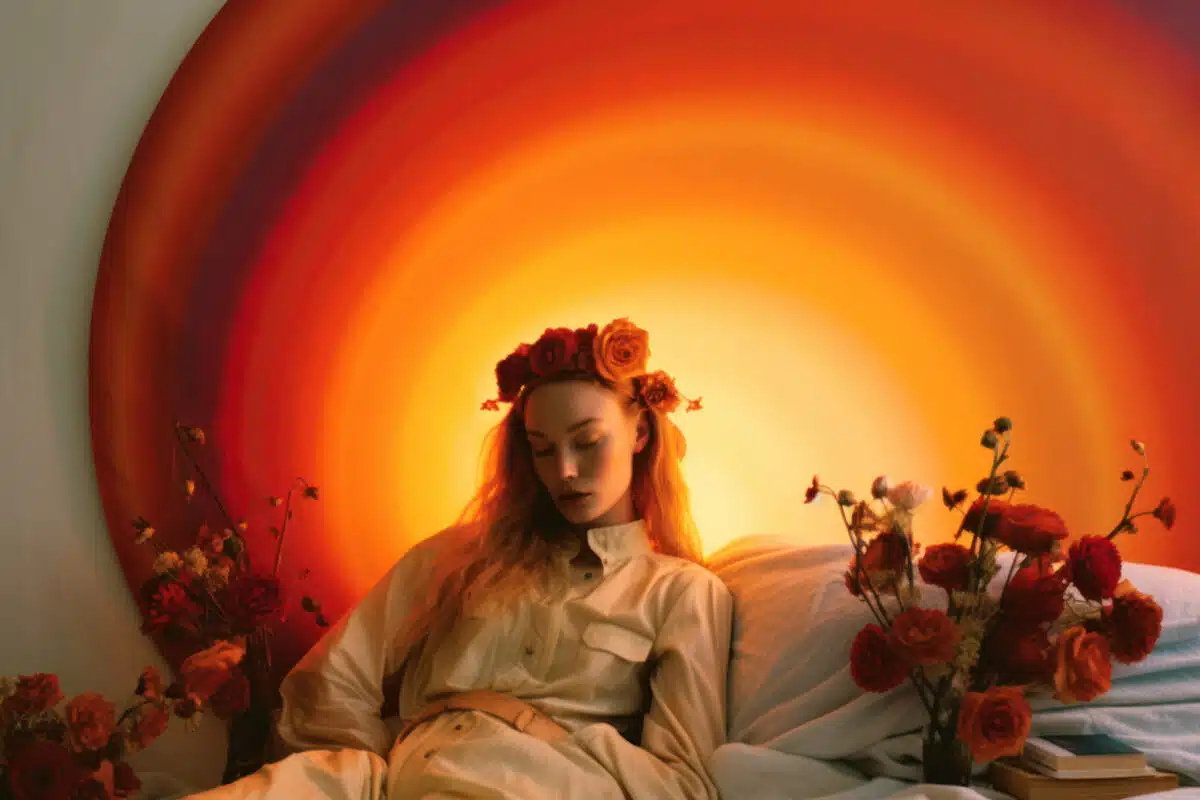
If you want to revisit the fluttering emotions brought by a lost love or want to relive the sweetest moments with your love, then this category is for you.
Surrender to the timeless verses and melodies of longing and passion where the heart aches with the lingering whispers of the past love.
“I Wonder Why” by Ella Wheeler Wilcox
Do you remember that glorious June
When we were lovers, you and I?
Something there was in the robin’s tune,
Something there was in earth and sky,
That was never before, and never since then.
I wonder why.
Do you remember the bridge we crossed,
And lingered to see the ships go by,
With snowy sails to the free winds tossed?
I never pass that bridge but I sigh
With a sense at my heart as of something lost.
I wonder why.
Do you remember the song we sung,
Under the beautiful starlit sky?
The world was bright, and our hearts were young –
I cannot forget though I try and try.
How you smiled in my eyes while the echoes rung.
I wonder why.
Do you remember how debonair
The new moon shone when we said good-bye?
How it listened and smiled when we parted there?
I shall hate the new moon until I die –
Hate it for ever, nor think it fair.
I wonder why.
“Again it is September” by Jessie Redmon Fauset
Again it is September!
It seems so strange that I who made no vows
Should sit here desolate this golden weather
And wistfully remember—
A sigh of deepest yearning,
A glowing look and words that knew no bounds,
A swift response, an instant glad surrender
To kisses wild and burning!
Ay me!
Again it is September!
It seems so strange that I who kept those vows
Should sit here lone, and spent, and mutely praying
That I may not remember!
“To Rose” by Sara Teasdale
Rose, when I remember you,
Little lady, scarcely two,
I am suddenly aware
Of the angels in the air.
All your softly gracious ways
Make an island in my days
Where my thoughts fly back to be
Sheltered from too strong a sea.
All your luminous delight
Shines before me in the night
When I grope for sleep and find
Only shadows in my mind.
Rose, when I remember you,
White and glowing, pink and new,
With so swift a sense of fun
Altho’ life has just begun;
With so sure a pride of place
In your very infant face,
I should like to make a prayer
To the angels in the air:
“If an angel ever brings
Me a baby in her wings,
Please be certain that it grows
Very, very much like Rose.”
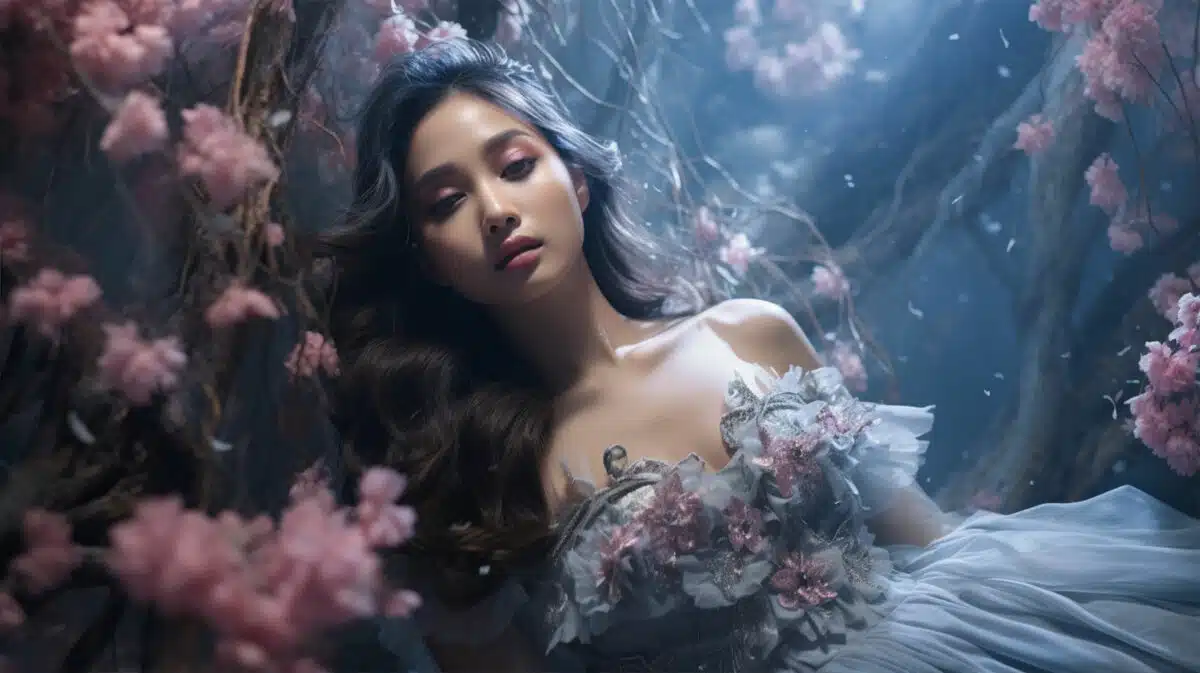
“Souvenir” by Edna St. Vincent Millay
Just a rainy day or two
In a windy tower,
That was all I had of you—
Saving half an hour.
Marred by greeting passing groups
In a cinder walk,
Near some naked blackberry hoops
Dim with purple chalk.
I remember three or four
Things you said in spite,
And an ugly coat you wore,
Plaided black and white.
Just a rainy day or two
And a bitter word.
Why do I remember you
As a singing bird?
“A Memory of Youth” by W.B. Yeats
The moments passed as at a play,
I had the wisdom love brings forth;
I had my share of mother wit
And yet for all that I could say,
And though I had her praise for it,
A cloud blown from the cut-throat north
Suddenly hid love’s moon away.
Believing every word I said
I praised her body and her mind
Till pride had made her eyes grow bright,
And pleasure made her cheeks grow red,
And vanity her footfall light,
Yet we, for all that praise, could find
Nothing but darkness overhead.
We sat as silent as a stone,
We knew, though she’d not said a word,
That even the best of love must die,
And had been savagely undone
Were it not that love upon the cry
Of a most ridiculous little bird
Tore from the clouds his marvellous moon.
“Nightfall” by Sara Teasdale
We will never walk again
As we used to walk at night,
Watching our shadows lengthen
Under the gold street-light
When the snow was new and white.
We will never walk again
Slowly, we two,
In spring when the park is sweet
With midnight and with dew,
And the passers-by are few.
I sit and think of it all,
And the blue June twilight dies,
Down in the clanging square
A street-piano cries
And stars come out in the skies.
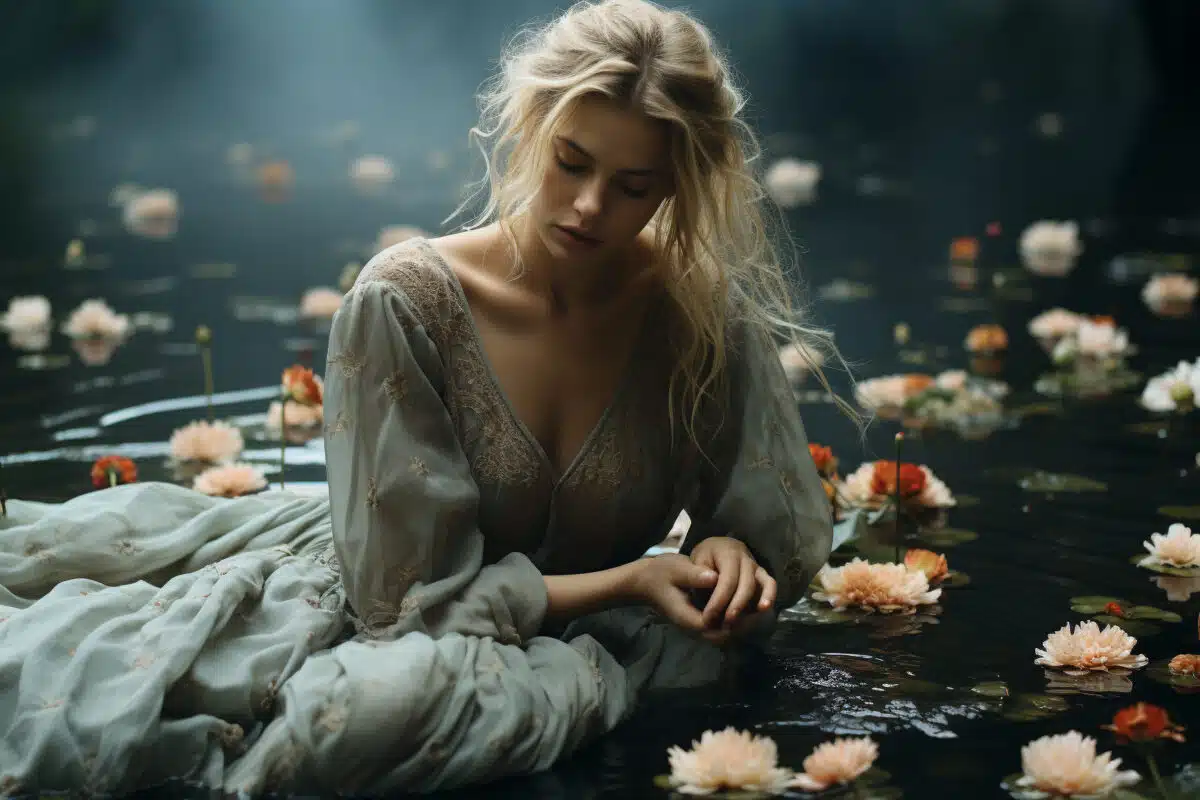
“The End” by D. H. Lawrence (David Herbert Richards)
If I could have put you in my heart,
If but I could have wrapped you in myself,
How glad I should have been!
And now the chart
Of memory unrolls again to me
The course of our journey here, before we had to part.
And oh, that you had never, never been
Some of your selves, my love, that some
Of your several faces I had never seen!
And still they come before me, and they go,
And I cry aloud in the moments that intervene.
And oh, my love, as I rock for you to-night,
And have not any longer any hope
To heal the suffering, or make requite
For all your life of asking and despair,
I own that some of me is dead to-night.
“Across the Table. To A. L. L.” by Bliss Carman (William)
Here’s to you, Arthur! You and I
Have seen a lot of stormy weather,
Since first we clinked cups on the sly
At school together.
The winds of fate have had their will
And blown our crafts so far apart
We hardly knew if either still
Were on the chart.
But now I know the love of man
Is more than time or space or fate,
And laugh to scorn the powers that ban,
With you for mate.
It’s good to have you sitting by,
Old man, to prove the world no botch,
To shame the devil with your eye
And pass the Scotch.
“Remember The Time. (The Castilian Maid.)” by Thomas Moore
Remember the time, in La Mancha’s shades,
When our moments so blissfully flew;
When you called me the flower of Castilian maids,
And I blushed to be called so by you;
When I taught you to warble the gay seguadille.
And to dance to the light castanet;
Oh, never, dear youth, let you roam where you will,
The delight of those moments forget.
They tell me, you lovers from Erin’s green isle,
Every hour a new passion can feel;
And that soon, in the light of some lovelier smile.
You’ll forget the poor maid of Castile.
But they know not how brave in battle you are,
Or they never could think you would rove;
For ’tis always the spirit most gallant in war
That is fondest and truest in Love.
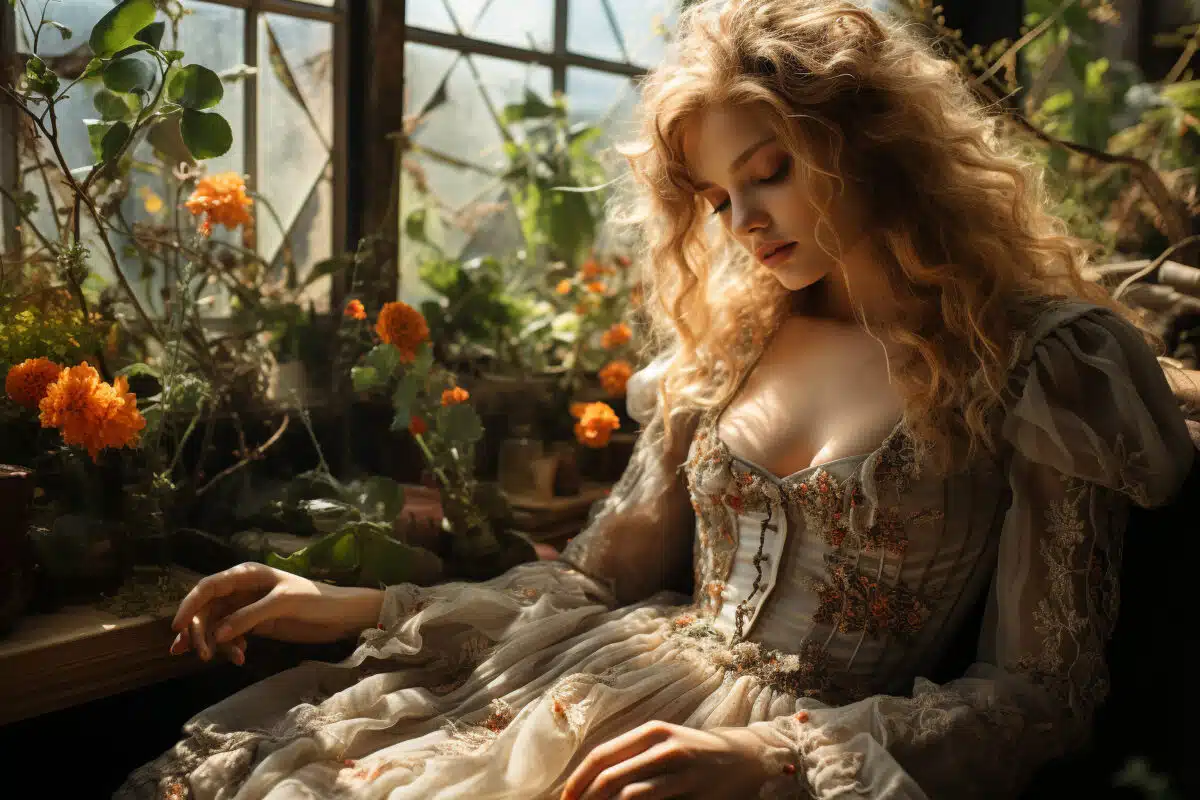
“Reminiscence” by John Charles McNeill
We sang old love-songs on the way
In sad and merry snatches,
Your fingers o’er the strings astray
Strumming the random catches.
And ever, as the skiff plied on
Among the trailing willows,
Trekking the darker deeps to shun
The gleaming sandy shallows,
It seemed that we had, ages gone,
In some far summer weather,
When this same faery moonlight shone,
Sung these same songs together.
And every grassy cape we passed,
And every reedy island,
Even the bank’d cloud in the west
That loomed a sombre highland;
And you, with dewmist on your hair,
Crowned with a wreath of lilies,
Laughing like Lalage the fair
And tender-eyed like Phyllis:
I know not if ‘t were here at home,
By some old wizard’s orders,
Or long ago in Crete or Rome
Or fair Provencal borders,
But now, as when a faint flame breaks
From out its smouldering embers,
My heart stirs in its sleep, and wakes,
And yet but half-remembers
That you and I some other time
Moved through this dream of glory,
Like lovers in an ancient rhyme,
A long-forgotten story.
“Jewels” by Sara Teasdale
If I should see your eyes again,
I know how far their look would go
Back to a morning in the park
With sapphire shadows on the snow.
Or back to oak trees in the spring
When you unloosed my hair and kissed
The head that lay against your knees
In the leaf shadow’s amethyst.
And still another shining place
We would remember, how the dun
Wild mountain held us on its crest
One diamond morning white with sun.
But I will turn my eyes from you
As women turn to put away
The jewels they have worn at night
And cannot wear in sober day.
“Yesterday and To-Morrow” by Paul Laurence Dunbar
Yesterday I held your hand,
Reverently I pressed it,
And its gentle yieldingness
From my soul I blessed it.
But to-day I sit alone,
Sad and sore repining;
Must our gold forever know
Flames for the refining?
Yesterday I walked with you,
Could a day be sweeter?
Life was all a lyric song
Set to tricksy meter.
Ah, to-day is like a dirge,—
Place my arms around you,
Let me feel the same dear joy
As when first I found you.
Let me once retrace my steps,
From these roads unpleasant,
Let my heart and mind and soul
All ignore the present.
Yesterday the iron seared
And to-day means sorrow.
Pause, my soul, arise, arise,
Look where gleams the morrow.
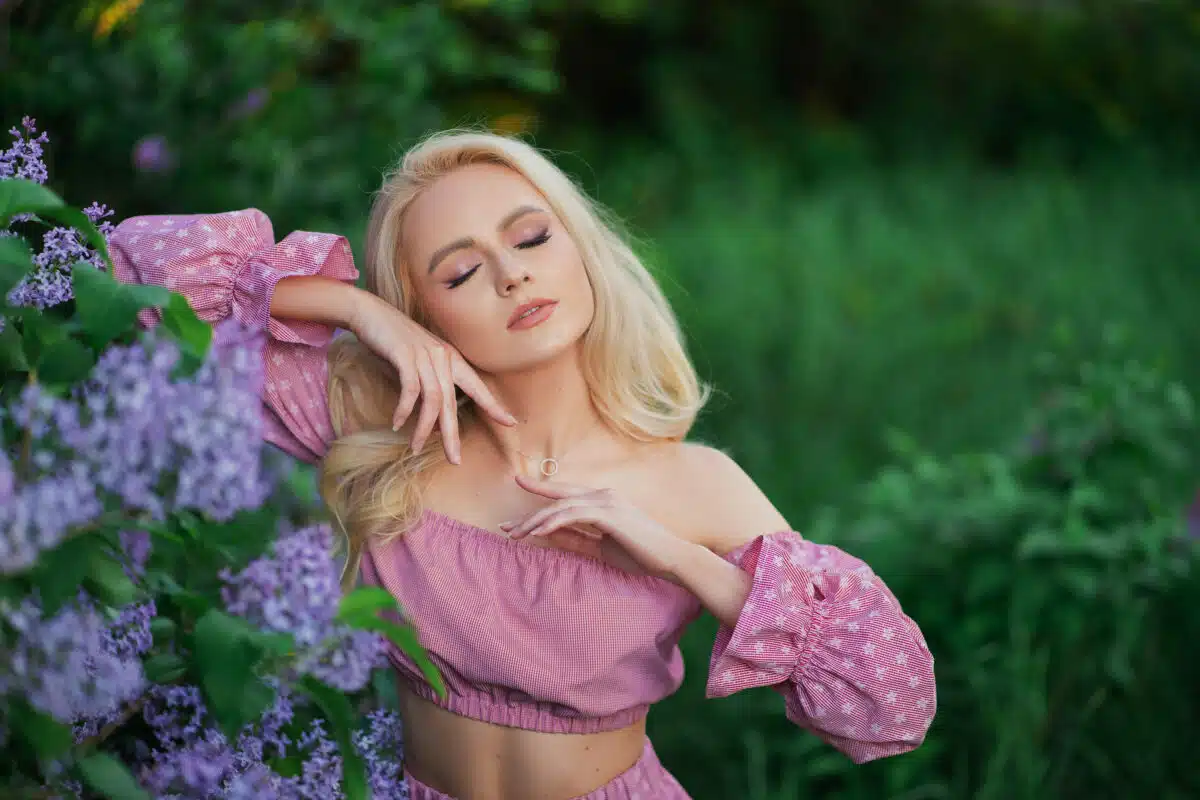
“Unanswered” by Madison Julius Cawein
How long ago it is since we went Maying!
Since she and I went Maying long ago! –
The years have left my forehead lined, I know,
Have thinned my hair around the temples graying.
Ah, time will change us: yea, I hear it saying –
“She too grows old: the face of rose and snow
Has lost its freshness: in the hair’s brown glow
Some strands of silver sadly, too, are straying.
The form you knew, whose beauty so enspelled,
Has lost the litheness of its loveliness:
And all the gladness that her blue eyes held
Tears and the world have hardened with distress.” –
“True! true!” I answer, “O ye years that part!
These things are chaned – but is her heart, her heart?”
“A Memory” by Lola Ridge
I remember
The crackle of the palm trees
Over the mooned white roofs of the town…
The shining town…
And the tender fumbling of the surf
On the sulphur-yellow beaches
As we sat… a little apart… in the close-pressing night.
The moon hung above us like a golden mango,
And the moist air clung to our faces,
Warm and fragrant as the open mouth of a child
And we watched the out-flung sea
Rolling to the purple edge of the world,
Yet ever back upon itself…
As we…
Inadequate night…
And mooned white memory
Of a tropic sea…
How softly it comes up
Like an ungathered lily.
“The Song of Wandering Aengus” by W. B. Yeats
I went out to the hazel wood,
Because a fire was in my head,
And cut and peeled a hazel wand,
And hooked a berry to a thread;
And when white moths were on the wing,
And moth-like stars were flickering out,
I dropped the berry in a stream
And caught a little silver trout.
When I had laid it on the floor
I went to blow the fire a-flame,
But something rustled on the floor,
And someone called me by my name:
It had become a glimmering girl
With apple blossom in her hair
Who called me by my name and ran
And faded through the brightening air.
Though I am old with wandering
Through hollow lands and hilly lands,
I will find out where she has gone,
And kiss her lips and take her hands;
And walk among long dappled grass,
And pluck till time and times are done,
The silver apples of the moon,
The golden apples of the sun.
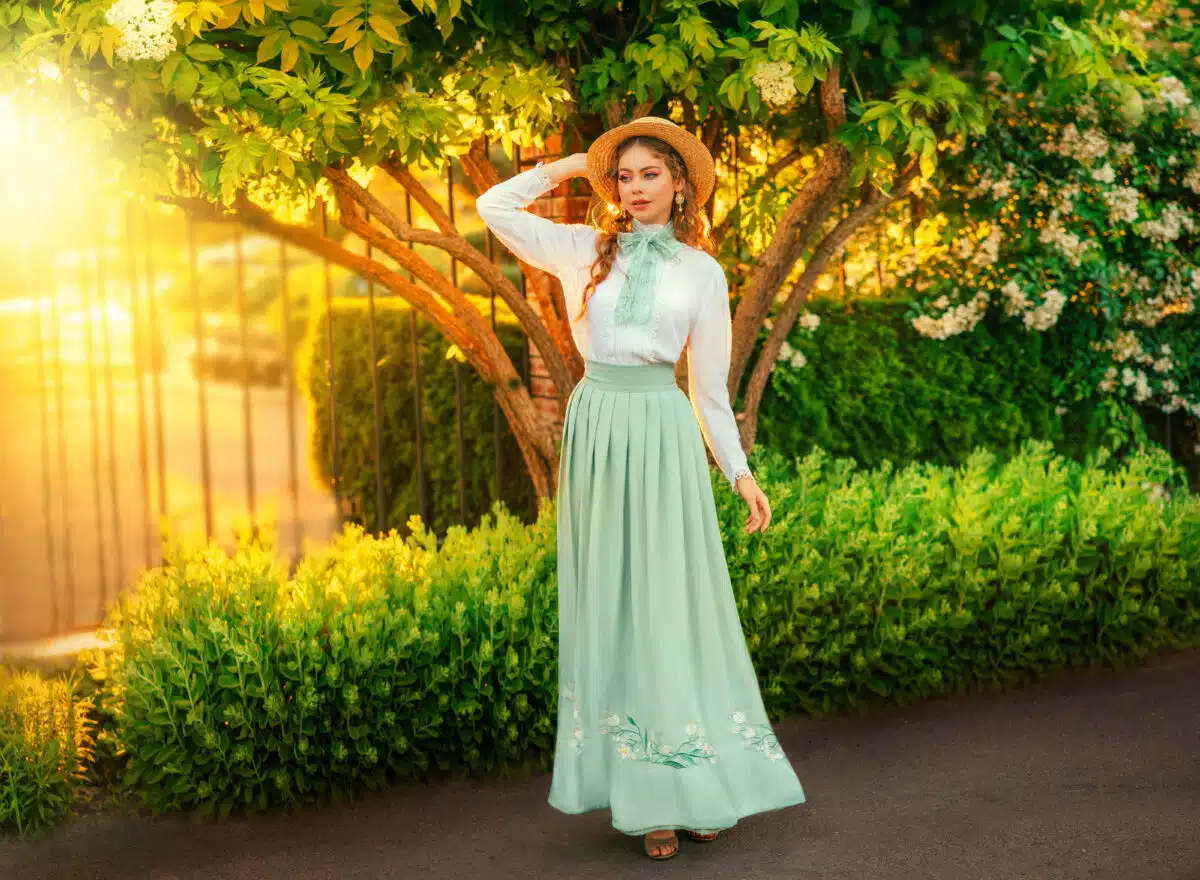
“Memory Of Sun” by Anna Akhmatova
Memory of sun seeps from the heart.
Grass grows yellower.
Faintly if at all the early snowflakes
Hover, hover.
Water becoming ice is slowing in
The narrow channels.
Nothing at all will happen here again,
Will ever happen.
Against the sky the willow spreads a fan
The silk’s torn off.
Maybe it’s better I did not become
Your wife.
Memory of sun seeps from the heart.
What is it? — Dark?
Perhaps! Winter will have occupied us
In the night.
“Quick And Bitter” by Yehuda Amichai
The end was quick and bitter.
Slow and sweet was the time between us,
slow and sweet were the nights
when my hands did not touch one another in despair but in the love
of your body which came between them.
And when I entered into you
it seemed then that great happiness
could be measured with precision
of sharp pain. Quick and bitter.
Slow and sweet were the nights.
Now is bitter and grinding as sand,
“Let’s be sensible” and similar curses.
And as we stray further from love
we multiply the words,
words and sentences so long and orderly.
Had we remained together
we could have become a silence.
“Michael Robartes remembers forgotten Beauty” by W.B. Yeats
When my arms wrap you round I press
My heart upon the loveliness
That has long faded from the world;
The jewelled crowns that kings have hurled
In shadowy pools, when armies fled;
The love-tales wove with silken thread
By dreaming ladies upon cloth
That has made fat the murderous moth;
The roses that of old time were
Woven by ladies in their hair,
The dew-cold lilies ladies bore
Through many a sacred corridor
Where such gray clouds of incense rose
That only the gods’ eyes did not close:
For that pale breast and lingering hand
Come from a more dream-heavy land,
A more dream-heavy hour than this;
And when you sigh from kiss to kiss
I hear white Beauty sighing, too,
For hours when all must fade like dew
But flame on flame, deep under deep,
Throne over throne, where in half sleep
Their swords upon their iron knees
Brood her high lonely mysteries.
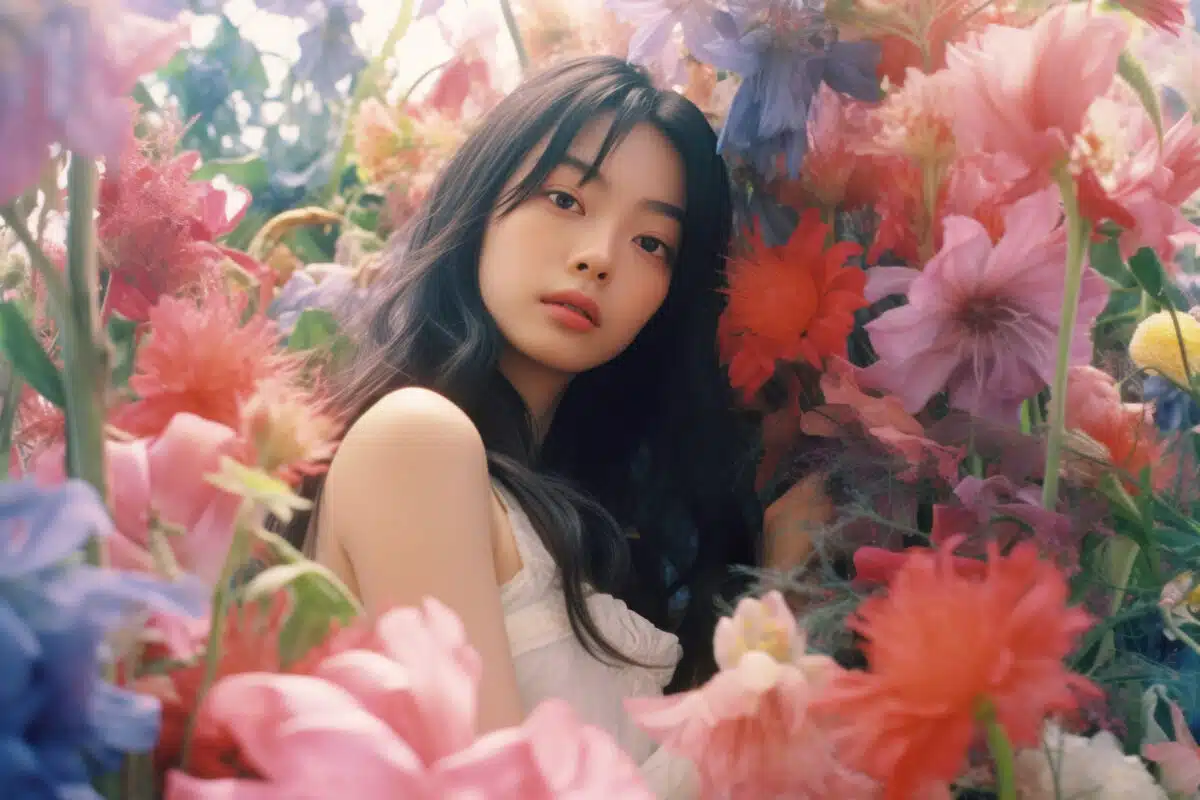
“Fragrant Memories” by Victor De Meijere (Jethro Bithell, Translator)
Although so pure I saw you in your wealth
Ofgolden hair, wherein I thought to lie
So that my passion’s burning pain should die,
While sacred love should nurse me back to health, —
Although I loved you more than lips could speak,
I said: Not till my heart with cooler blood
Knew its well- being in a stanchless flood
Of mad and rapturous music, would I seek.
But now your love has waned and withered, now
I have forgotten, and only memory
Brings back your face-my heart is nigh to break.
For memories will not wholly set me free,
But frostily hang on my pallid brow.
Dear, would you kiss my cheeks for old times’ sake?
“Absence” by Elizabeth Jennings
I visited the place where we last met.
Nothing was changed, the gardens were well-tended,
The fountains sprayed their usual steady jet;
There was no sign that anything had ended
And nothing to instruct me to forget.
The thoughtless birds that shook out of the trees,
Singing an ecstasy I could not share,
Played cunning in my thoughts. Surely in these
Pleasures there could not be a pain to bear
Or any discord shake the level breeze.
It was because the place was just the same
That made your absence seem a savage force,
For under all the gentleness there came
An earthquake tremor: Fountain, birds and grass
Were shaken by my thinking of your name.
“Love Lies Bleeding” by Christina Georgina Rossetti
Love that is dead and buried, yesterday
Out of his grave rose up before my face,
No recognition in his look, no trace
Of memory in his eyes dust-dimmed and grey.
While I, remembering, found no word to say,
But felt my quickened heart leap in its place;
Caught afterglow thrown back from long set days,
Caught echoes of all music passed away.
Was this indeed to meet? – I mind me yet
In youth we met when hope and love were quick,
We parted with hope dead, but love alive:
I mind me how we parted then heart sick,
Remembering, loving, hopeless, weak to strive: –
Was this to meet? Not so, we have not met.
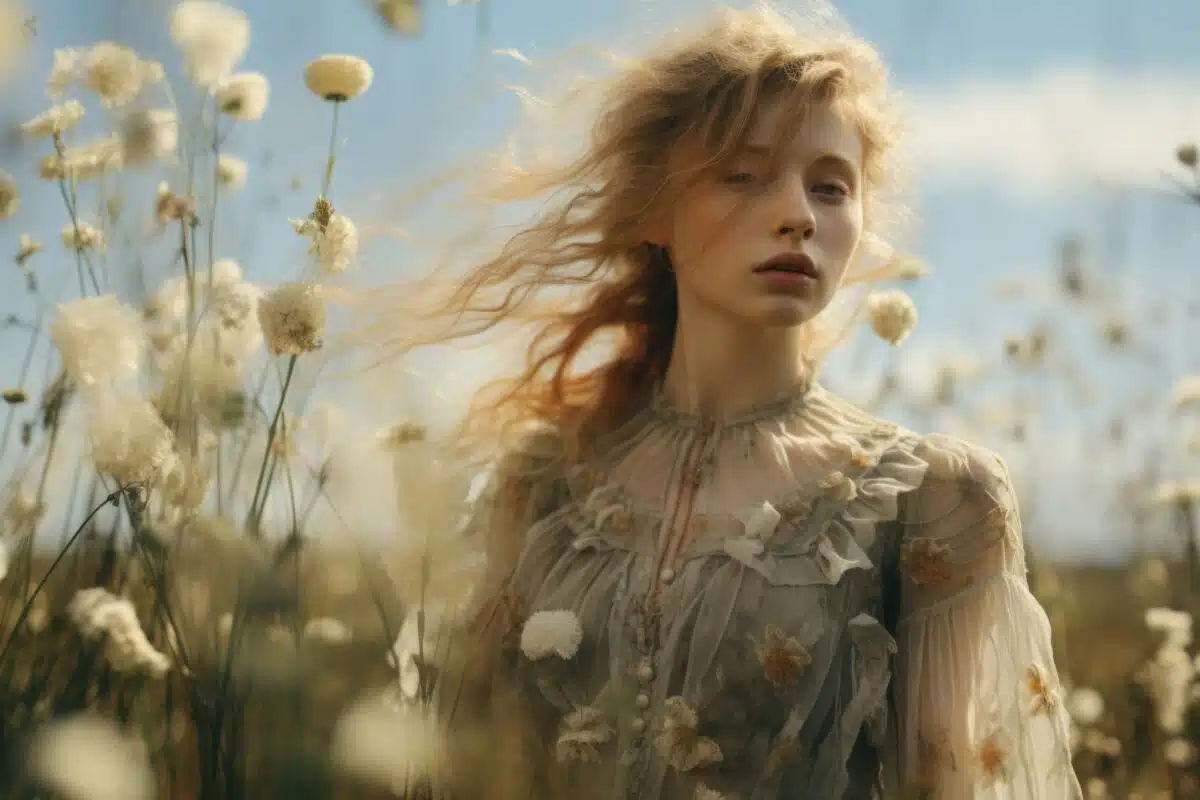
“The Blonde Maiden” by Bjørnstjerne Martinius Bjørnson
Though she depart, a vision flitting,
If I these thoughts in words exhale:
I love you, you blonde maiden, sitting
Within your pure white beauty’s veil.
I love you for your blue eyes dreaming,
Like moonlight moving over snow,
And ‘mid the far-off forests beaming
On something hid I may not know.
I love this forehead’s fair perfection
Because it stands so starry-clear,
In flood of thought sees its reflection
And wonders at the image near.
I love these locks in riot risen
Against the hair-net’s busy bands;
To free them from their pretty prison
Their sylphs entice my eyes and hands.
I love this figure’s supple swinging
In rhythm of its bridal song,
Of strength and life-joy daily singing
With youthful yearnings deep and long.
I love this foot so lightly bearing
The glory of sure victory
Through youth’s domain of merry daring
To meet first-love that hers shall be.
I love these hands, these lips enchanting,
With them the God of love’s allied,
With them the apple-prize is granting,
But guards them, too, lest aught betide.
I love you and must say it ever,
Although you heed not what you’ve heard,
But flee and answer: maidens never
May put their trust in poet’s word.
Nostalgia Poems About Childhood
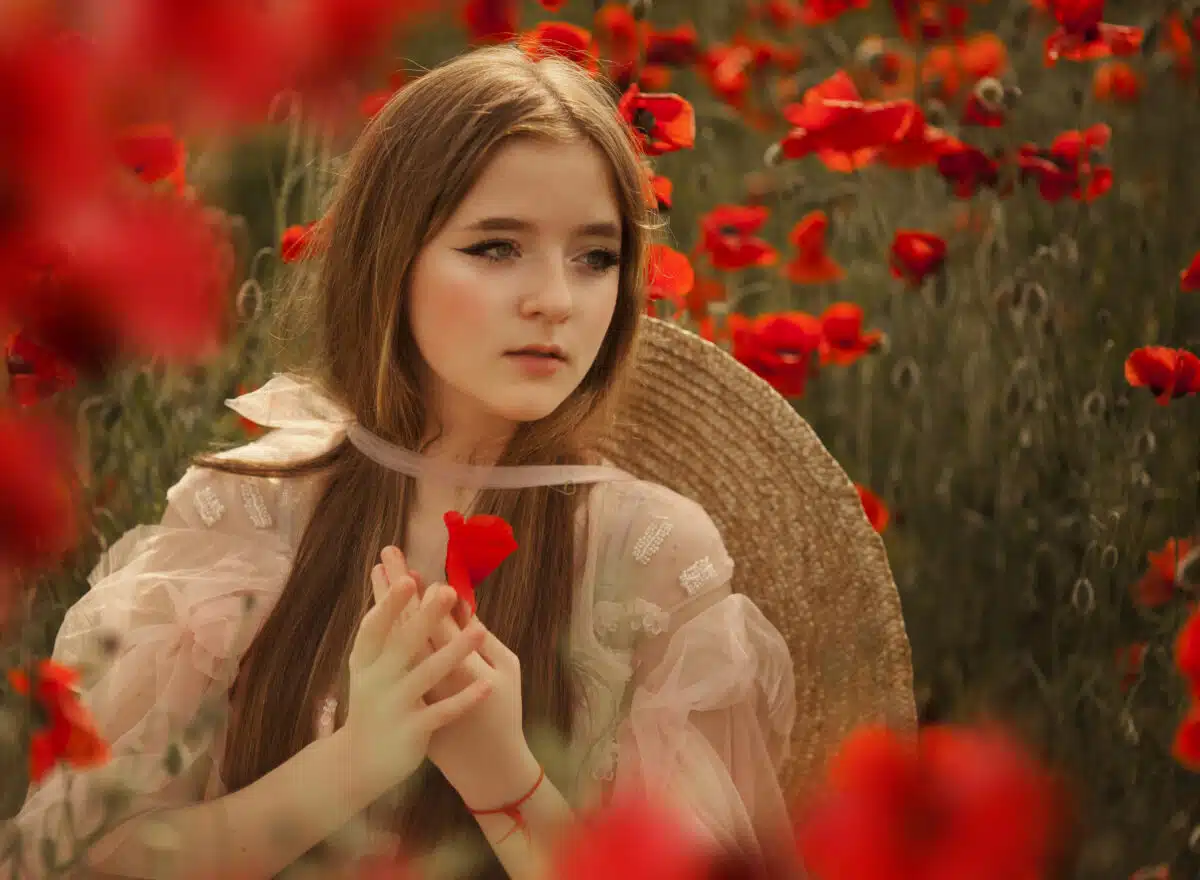
Let the innocence of these verses from poets of different generations transport you to a time of carefree adventures, endless imaginations, and the purest form of joy.
Delight the childhood within you with our selection of poems that speak of those cherished early years.
“When I Was Twenty” by Bliss Carman (William)
It was June, and I was twenty.
All my wisdom, poor but plenty,
Never learned Festina lente.
Youth is gone, but whither went he?
Madeline came down the orchard
With a mischief in her eye,
Half demure and half inviting,
Melting, wayward, wistful, shy.
Four bright eyes that found life lovely,
And forgot to wonder why;
Four warm lips at one love-lesson,
Learned by heart so easily.
We gained something of that knowledge
No man ever yet put by,
But his after days of sorrow
Left him nothing but to die.
Madeline went up the orchard,
Down the hurrying world went I;
Now I know love has no morrow,
Happiness no by-and-by.
Youth is gone, but whither went he?
All my wisdom, poor but plenty,
Never learned Festina lente.
It was June, and I was twenty.
“The Tropics in New York” by Claude McKay
Bananas ripe and green, and ginger-root,
Cocoa in pods and alligator pears,
And tangerines and mangoes and grape fruit,
Fit for the highest prize at parish fairs,
Set in the window, bringing memories
Of fruit-trees laden by low-singing rills,
And dewy dawns, and mystical blue skies
In benediction over nun-like hills.
My eyes grew dim, and I could no more gaze;
A wave of longing through my body swept,
And, hungry for the old, familiar ways,
I turned aside and bowed my head and wept.
“Emily Sparks” by Edgar Lee Masters
Where is my boy, my boy—
In what far part of the world?
The boy I loved best of all in the school?—
I, the teacher, the old maid, the virgin heart,
Who made them all my children.
Did I know my boy aright,
Thinking of him as spirit aflame,
Active, ever aspiring?
Oh, boy, boy, for whom I prayed and prayed
In many a watchful hour at night,
Do you remember the letter I wrote you
Of the beautiful love of Christ?
And whether you ever took it or not,
My boy, wherever you are,
Work for your soul’s sake,
That all the clay of you, all of the dross of you,
May yield to the fire of you,
Till the fire is nothing but light!…
Nothing but light!
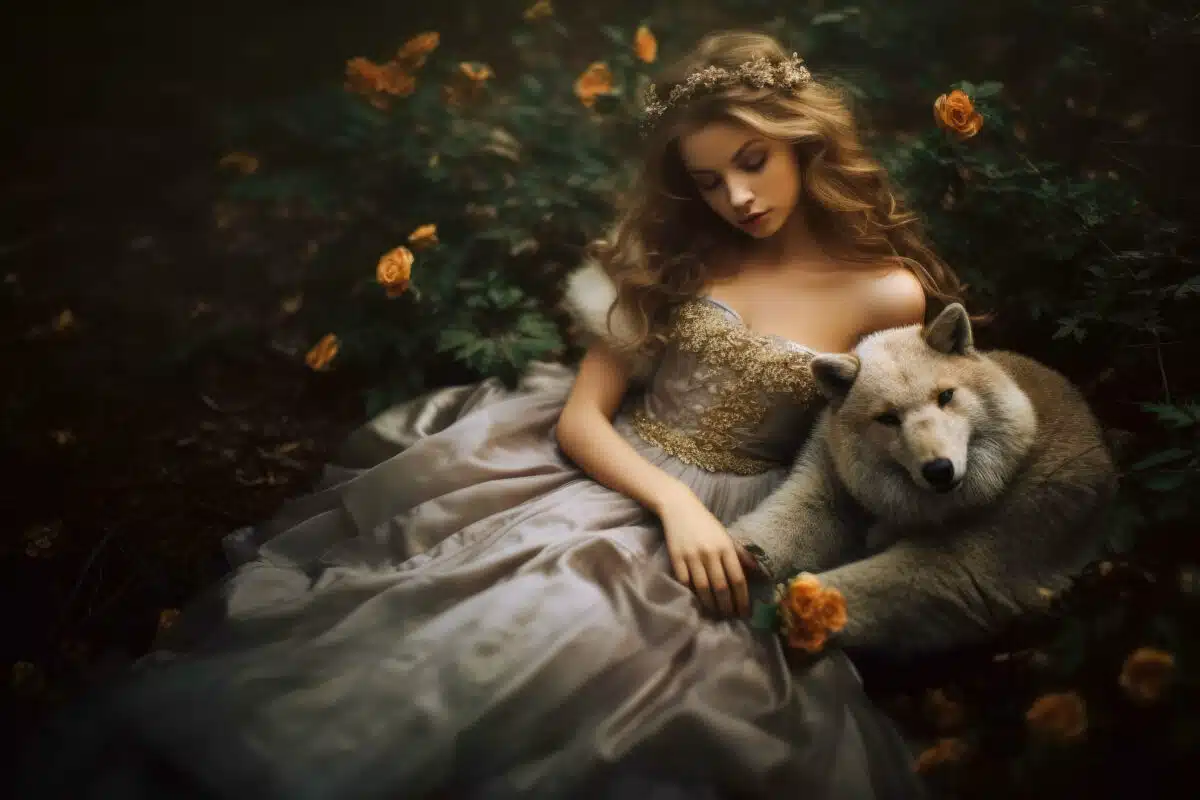
“Youth and Age” by Henry Wadsworth Longfellow
Oh give me back the days when loose and free
To my blind passion were the curb and rein,
Oh give me back the angelic face again,
With which all virtue buried seems to be!
Oh give my panting footsteps back to me,
That are in age so slow and fraught with pain,
And fire and moisture in the heart and brain,
If thou wouldst have me burn and weep for thee!
If it be true thou livest alone, Amor,
On the sweet-bitter tears of human hearts,
In an old man thou canst not wake desire;
Souls that have almost reached the other shore
Of a diviner love should feel the darts,
And be as tinder to a holier fire.
“Old Photographs” by George Augustus Baker, Jr.
Old lady, put your glasses on,
With polished lenses, mounting golden,
And once again look slowly through
The album olden.
How the old portraits take you back
To friends who once would ’round you gather
All scattered now, like frosted leaves
In blustering weather.
Why, who is this, the bright coquette?
Her eyes with Love’s bright arrows laden
“Poor Nell, she’s living single yet,
An ancient maiden.”
And this, the fragile poetess?
Whose high soul-yearnings nought can smother
“She’s stouter far than I am now,
A kind grandmother.”
Who is this girl with flowing curls,
Who on the golden future muses?
“What splendid hair she had! and now
A ‘front’ she uses.”
And this? “Why, if it’s not my own;
And did I really e’er resemble
That bright young creature? Take the book
My old hands tremble.
“It seems that only yesterday
We all were young; ah, how time passes!”
Old lady, put the album down,
And wipe your glasses.
“When I Was One-And-Twenty” by A. E. Housman
When I was one-and-twenty
I heard a wise man say,
‘Give crowns and pounds and guineas
But not your heart away;
Give pearls away and rubies
But keep your fancy free.’
But I was one-and-twenty,
No use to talk to me.
When I was one-and-twenty
I heard him say again,
‘The heart out of the bosom
Was never given in vain;
’Tis paid with sighs a plenty
And sold for endless rue.’
And I am two-and-twenty,
And oh, ’tis true, ’tis true.
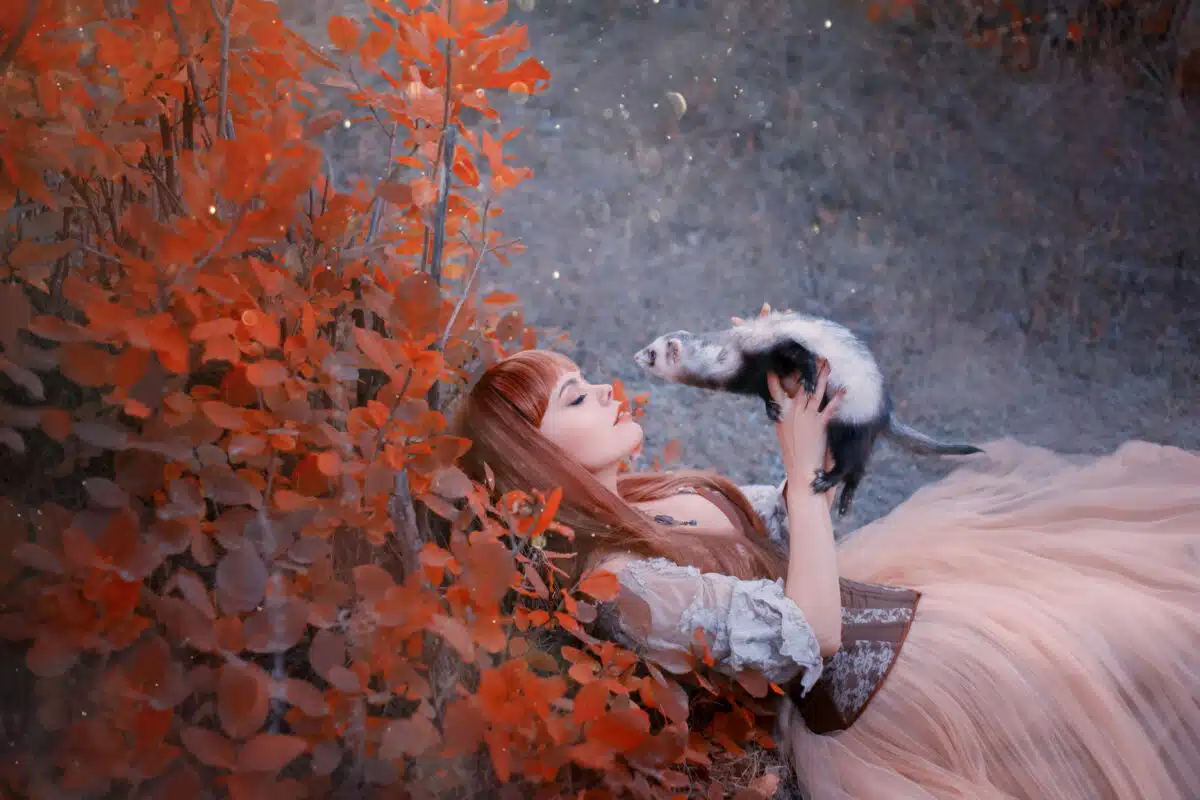
“Childhood Memories” by William Saphier
Those years are foliage of trees
their trunks hidden by bushes;
behind them a gray haze topped with silver
hides the swinging steps of my first love
the Danube.
On its face
grave steel palaces with smoking torches,
parading monasteries moved slowly to the Black Sea
till the bared branches scratched the north wind.
On its bed
a great Leviathan waited
for the ceremonies on the arrival of Messiah
and bobbing small fishes snapped sun splinters
for the pleasure of the monster.
Along its shores
red capped little hours danced
with rainbow colored kites,
messengers to heaven.
My memory is a sigh
of swallows swinging
through a slow dormant summer
to a timid line on the horizon.
“When You Are Old” by William Butler Yeats
When you are old and grey and full of sleep,
And nodding by the fire, take down this book,
And slowly read, and dream of the soft look
Your eyes had once, and of their shadows deep;
How many loved your moments of glad grace,
And loved your beauty with love false or true,
But one man loved the pilgrim Soul in you,
And loved the sorrows of your changing face;
And bending down beside the glowing bars,
Murmur, a little sadly, how Love fled
And paced upon the mountains overhead
And hid his face amid a crowd of stars.
“Days of My Youth” by St. George Tucker
Days of my youth,
Ye have glided away;
Hairs of my youth,
Ye are frosted and gray;
Eyes of my youth,
Your keen sight is no more;
Cheeks of my youth,
Ye are furrowed all o’er;
Strength of my youth,
All your vigor is gone;
Thoughts of my youth,
Your gay visions are flown.
Days of my youth,
I wish not your recall;
Hairs of my youth,
I ’m content ye should fall;
Eyes of my youth,
You much evil have seen;
Cheeks of my youth,
Bathed in tears have you been;
Thoughts of my youth,
You have led me astray;
Strength of my youth,
Why lament your decay?
Days of my age,
Ye will shortly be past;
Pains of my age,
Yet awhile ye can last;
Joys of my age,
In true wisdom delight;
Eyes of my age,
Be religion your light;
Thoughts of my age,
Dread ye not the cold sod;
Hopes of my age,
Be ye fixed on your God.
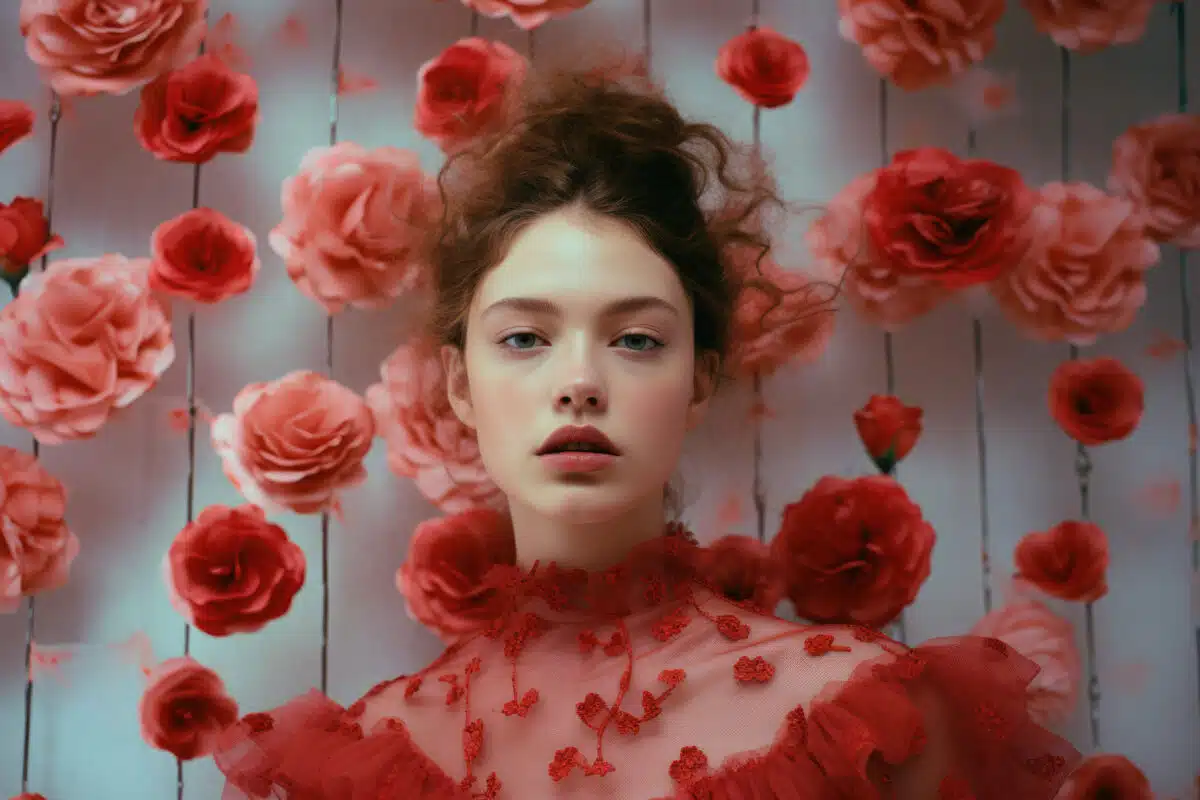
“Sweet Are the Flowers of Life” by Louisa May Alcott
Sweet are the flowers of life,
Swept o’er my happy days at home;
Sweet are the flowers of life
When I was a little child.
Sweet are the flowers of life
That I spent with my father at home;
Sweet are the flowers of life
When children played about the house.
Sweet are the flowers of life
When the lamps are lighted at night;
Sweet are the flowers of life
When the flowers of summer bloomed.
Sweet are the flowers of life
Dead with the snows of winter;
Sweet are the flowers of life
When the days of spring come on.
“The Retreat” by Henry Vaughan
Happy those early days, when I
Shin’d in my Angel-infancy!
Before I understood this place
Appointed for my second race,
Or taught my soul to fancy aught
But a white celestial thought:
When yet I had not walk’d above
A mile or two from my first Love,
And looking back—at that short space—
Could see a glimpse of His bright face:
When on some gilded cloud, or flow’r,
My gazing soul would dwell an hour,
And in those weaker glories spy
Some shadows of eternity:
Before I taught my tongue to wound
My Conscience with a sinful sound,
Or had the black art to dispense
A several sin to ev’ry sense,
But felt through all this fleshly dress
Bright shoots of everlastingness.
O how I long to travel back,
And tread again that ancient track!
That I might once more reach that plain
Where first I left my glorious train;
From whence th’ enlightned spirit sees
That shady City of Palm-trees.
But ah! my soul with too much stay
Is drunk, and staggers in the way!
Some men a forward motion love,
But I by backward steps would move;
And when this dust falls to the urn,
In that state I came, return.
“The School Where I Studied” by Yehuda Amichai
I passed by the school where I studied as a boy
and said in my heart: here I learned certain things
and didn’t learn others. All my life I have loved in vain
the things I didn’t learn. I am filled with knowledge,
I know all about the flowering of the tree of knowledge,
the shape of its leaves, the function of its root system, its pests and parasites.
I’m an expert on the botany of good and evil,
I’m still studying it, I’ll go on studying till the day I die.
I stood near the school building and looked in. This is the room
where we sat and learned. The windows of a classroom always open
to the future, but in our innocence we thought it was only landscape
we were seeing from the window.
The schoolyard was narrow, paved with large stones.
I remember the brief tumult of the two of us
near the rickety steps, the tumult
that was the beginning of a first great love.
Now it outlives us, as if in a museum,
like everything else in Jerusalem.

“When the Young Are Grown” by Edgar Albert Guest
Once the house was lovely, but it’s lonely here to-day,
For time has come an’ stained its walls an’ called the young away;
An’ all that’s left for mother an’ for me till life is through
Is to sit an’ tell each other what the children used to do.
We couldn’t keep ’em always an’ we knew it from the start;
We knew when they were babies that some day we’d have to part.
But the years go by so swiftly, an’ the littlest one has flown,
An’ there’s only me an’ mother now left here to live alone.
Oh, there’s just one consolation, as we’re sittin’ here at night,
They’ve grown to men an’ women, an’ we brought ’em up all right;
We’ve watched ’em as we’ve loved ’em an’ they’re splendid, every one,
An’ we feel the Lord won’t blame us for the way our work was done.
They’re clean, an’ kind an’ honest, an’ the world respects ’em, too;
That’s the dream of parents always, an’ our dreams have all come true.
So although the house is lonely an’ sometimes our eyes grow wet,
We are proud of them an’ happy an’ we’ve nothing to regret.
“Selling the Old Home” by Edgar Albert Guest
The little house has grown too small, or rather we have grown
Too big to dwell within the walls where all our joys were known.
And so, obedient to the wish of her we love so well,
I have agreed for sordid gold the little home to sell.
Now strangers come to see the place, and secretly I sigh,
And deep within my breast I hope that they’ll refuse to buy.
“This bedroom’s small,” one woman said; up went her nose in scorn!
To me that is the splendid room where little Bud was born.
“The walls are sadly finger-marked,” another stranger said.
A lump came rising in my throat; I felt my cheeks grow red.
“Yes, yes,” I answered, “so they are. The fingermarks are free
But I’d not leave them here if I could take them all with me.”
“The stairway shows the signs of wear.” I answered her in heat,
“That’s but the glorious sign to me of happy little feet.
Most anyone can have a flight of shiny stairs and new
But those are steps where joy has raced, and love and laughter, too.”
“This paper’s ruined! Here are scrawled some pencil marks, I note.”
I’d treasured them for years. They were the first he ever wrote.
Oh I suppose we’ll sell the place; it’s right that we should go;
The children must have larger rooms in which to live and grow.
But all my joys were cradled here; ’tis here I’ve lived my best,
‘Tis here, whatever else shall come, we’ve been our happiest;
And though into a stranger’s hands this home I shall resign,
And take his gold in pay for it, I still shall call it mine.
“Twenty Years Ago” by Hanford Lennox Gordon
I am growing old and weary
Ere yet my locks are gray;
Before me lies eternity,
Behind me-but a day.
How fast the years are vanishing!
They melt like April snow:
It seems to me but yesterday-
Twenty years ago.
There’s the school-house on the hill-side,
And the romping scholars all;
Where we used to con our daily tasks,
And play our games of ball.
They rise to me in visions-
In sunny dreams-and ho’
I sport among the boys and girls
Twenty years ago.
We played at ball in summer time-
We boys-with hearty will;
With merry shouts in winter time
We coasted on the hill.
We would choose our chiefs, divide in bands,
And build our forts of snow,
And storm those forts right gallantly-
Twenty years ago.
Last year in June I visited
That dear old sacred spot,
But the school-house on the hill-side
And the merry shouts were not.
A church was standing where it stood;
I looked around, but no-
I could not see the boys and girls
Of twenty years ago.
There was sister dear, and brother,
Around the old home-hearth;
And a tender, Christian mother,
Too angel-like for earth.
She used to warn me from the paths
Where thorns and brambles grow,
And lead me in the “narrow way”-
Twenty years ago.
I loved her and I honored her
Through all my boyhood years;
I knew her joys-I knew her cares-
I knew her hopes and fears.
But alas, one autumn morning
She left her home below,
And she left us there a-weeping-
Twenty years ago.
They bore her to the church-yard,
With slow and solemn pace;
And there I took my last fond look
On her dear, peaceful face.
They lowered her in her silent grave,
While we bowed our heads in woe,
And they heaped the sods above her head-
Twenty years ago.
That low, sweet voice-my mother’s voice-
I never can forget;
And in those loving eyes I see
The big tears trembling yet.
I try to tread the “narrow way;”
I stumble oft I know:
I miss-how much!-the helping hand
Of twenty years ago.
Mary-(Mary I will call you-
‘Tis not the old-time name)
Sainted Mary-blue-eyed Mary-
Are you in heaven the same?
Are your eyes as bright and beautiful,
Your cheeks as full of glow,
As when the school-boy kissed you, May,
Twenty years ago?
How we swung upon the grape-vine
Down by the Genesee;
And I caught the speckled trout for you,
While you gathered flowers for me:
How we rambled o’er the meadows
With brows and cheeks aglow,
And hearts like God’s own angels-
Twenty years ago.
How our young hearts grew together
Until they beat as one;
Distrust it could not enter;
Cares and fears were none.
All my love was yours, dear Mary,
‘Twas boyish love, I know;
But I ne’er have loved as then I loved-
Twenty years ago.
How we pictured out the future-
The golden coming years,
And saw no cloud in all our sky,
No gloomy mist of tears;
But ah-how vain are human hopes!
The angels came-and O-
They bore my darling up to heaven-
Twenty years ago.
I will not tell-I cannot tell-
What anguish wrung my soul;
But a silent grief is on my heart
Though the years so swiftly roll;
And I cannot shake it off, May,
This lingering sense of woe,
Though I try to drown the memory
Of twenty years ago.
I am fighting life’s stern battle, May,
With all my might and main;
But a seat by you and mother there
Is the dearest prize to gain;
And I know you both are near me,
Whatever winds may blow,
For I feel your spirits cheer me
Like twenty years ago.
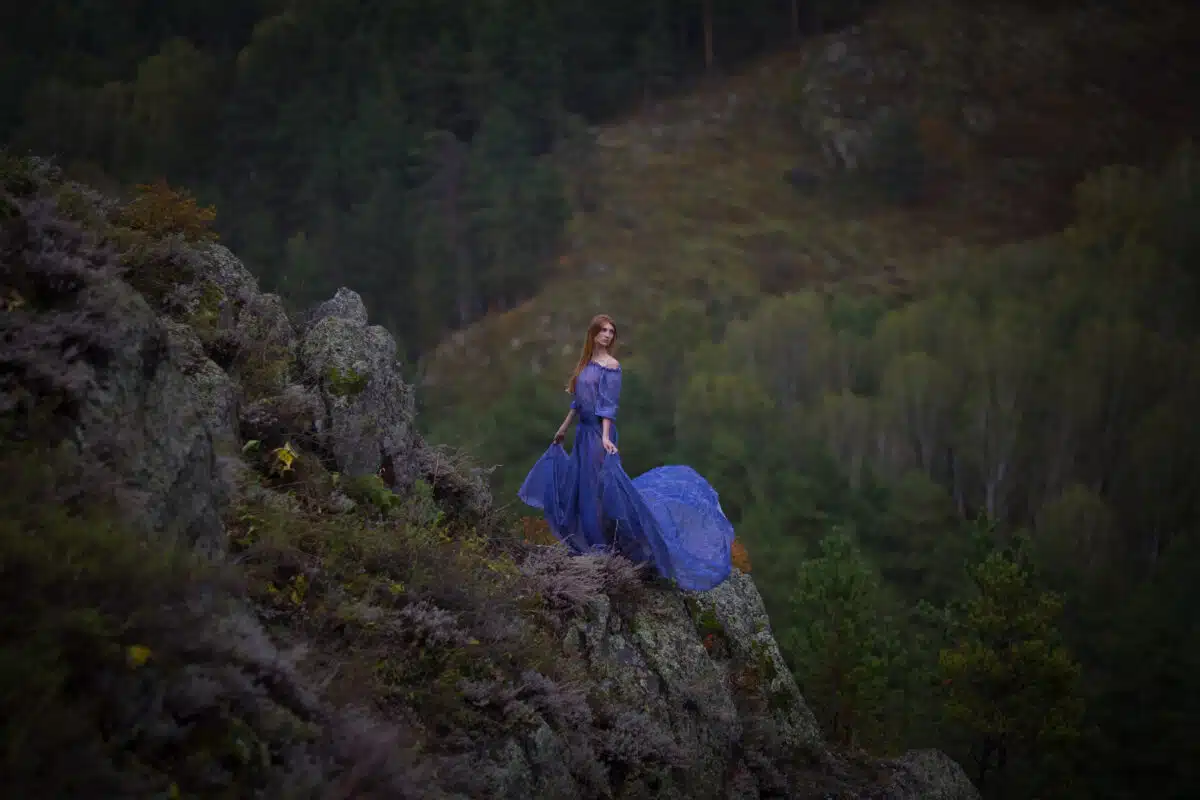
“A Hill Song” by Bliss Carman (William)
Hills where once my love and I
Let the hours go laughing by!
All your woods and dales are sad,–
You have lost your Oread.
Falling leaves! Silent woodlands!
Half your loveliness is fled.
Golden-rod, wither now!
Winter winds, come hither now!
All the summer joy is dead.
There’s a sense of something gone
In the grass I linger on.
There’s an under-voice that grieves
In the rustling of the leaves.
Pine-clad peaks! Rushing waters!
Glens where we were once so glad!
There’s a light passed from you,
There’s a joy outcast from you,–
You have lost your Oread.
“The Spanish Needle” by Claude McKay
Lovely dainty Spanish needle
With your yellow flower and white,
Dew bedecked and softly sleeping,
Do you think of me to-night?
Shadowed by the spreading mango,
Nodding o’er the rippling stream,
Tell me, dear plant of my childhood,
Do you of the exile dream?
Do you see me by the brook’s side
Catching crayfish ‘neath the stone,
As you did the day you whispered:
Leave the harmless dears alone?
Do you see me in the meadow
Coming from the woodland spring
With a bamboo on my shoulder
And a pail slung from a string?
Do you see me all expectant
Lying in an orange grove,
While the swee-swees sing above me,
Waiting for my elf-eyed love?
Lovely dainty Spanish needle,
Source to me of sweet delight,
In your far-off sunny southland
Do you dream of me to-night?
“Home Thoughts” by Claude McKay
Oh something just now must be happening there!
That suddenly and quiveringly here,
Amid the city’s noises, I must think
Of mangoes leaning o’er the river’s brink,
And dexterous Davie climbing high above,
The gold fruits ebon-speckled to remove,
And toss them quickly in the tangled mass
Of wis-wis twisted round the guinea grass;
And Cyril coming through the bramble-track
A prize bunch of bananas on his back;
And Georgie—none could ever dive like him—
Throwing his scanty clothes off for a swim;
And schoolboys, from Bridge-tunnel going home,
Watching the waters downward dash and foam.
This is no daytime dream, there’s something in it,
Oh something’s happening there this very minute!
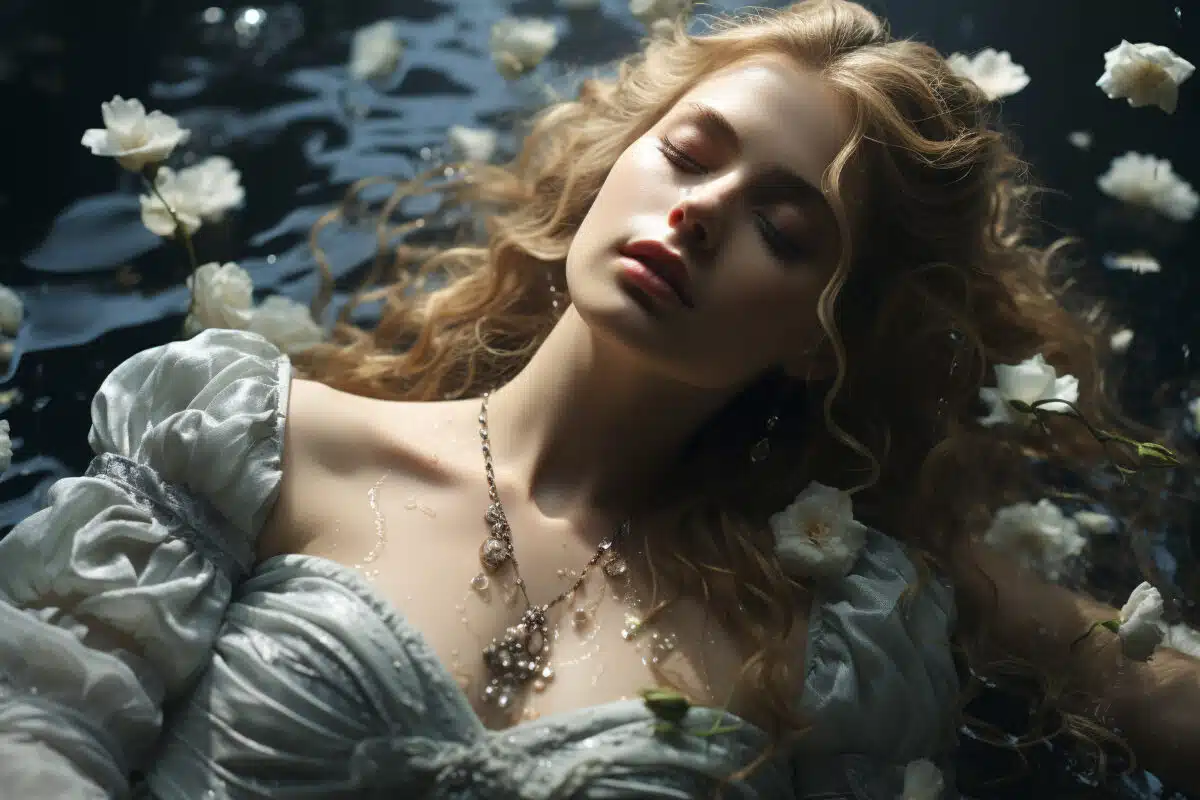
“Youth and Age” by Kahlil Gibran
In my youth the heart of dawn was in my heart, and the songs of April were in my ears.
But my soul was sad unto death, and I knew not why. Even unto this day I know not why I was sad.
But now, though I am with eventide, my heart is still veiling dawn,
And though I am with autumn, my ears still echo the songs of spring.
But my sadness has turned into awe, and I stand in the presence of life and life’s daily miracles.
The difference between my youth which was my spring, and these forty years, and they are my autumn, is the very difference that exists between flower and fruit.
A flower is forever swayed with the wind and knows not why and wherefore.
But the fruit overladen with the honey of summer, knows that it is one of life’s home-comings, as a poet when his song is sung knows sweet content,
Though life has been bitter upon his lips.
In my youth I longed for the unknown, and for the unknown I am still longing.
But in the days of my youth longing embraced necessity that knows naught of patience.
Today I long not less, but my longing is friendly with patience, and even waiting.
And I know that all this desire that moves within me is one of those laws that turns universes around one another in quiet ecstasy, in swift passion which your eyes deem stillness, and your mind a mystery.
And in my youth I loved beauty and abhorred ugliness, for beauty was to me a world separated from all other worlds.
But now that the gracious years have lifted the veil of picking-and-choosing from over my eyes, I know that all I have deemed ugly in what I see and hear, is but a blinder upon my eyes, and wool in my ears;
And that our senses, like our neighbors, hate what they do not understand.
And in my youth I loved the fragrance of flowers and their color.
Now I know that their thorns are their innocent protection, and if it were not for that innocence they would disappear forevermore.
And in my youth, of all seasons I hated winter, for I said in my aloneness, “Winter is a thief who robs the earth of her sun-woven garment, and suffers her to stand naked in the wind.”
But now I know that in winter there is re-birth and renewal, and that the wind tears the old raiment to cloak her with a new raiment woven by the spring.
And in my youth I would gaze upon the sun of the day and the stars of the night, saying in my secret, “How small am I, and how small a circle my dream makes.”
But today when I stand before the sun or the stars I cry, “The sun is close to me, and the stars are upon me;” for all the distances of my youth have turned into the nearness of age;
And the great aloneness which knows not what is far and what is near, nor what is small nor great, has turned into a vision that weighs not nor does it measure.
In my youth I was but the slave of the high tide and the ebb tide of the sea, and the prisoner of half moons and full moons.
Today I stand at this shore and I rise not nor do I go down.
Even my roots once every twenty-eight days would seek the heart of the earth.
And on the twenty-ninth day they would rise toward the throne of the sky.
And on that very day the rivers in my veins would stop for a moment, and then would run again to the sea.
Yes, in my youth I was a thing, sad and yielding, and all the seasons played with me and laughed in their hearts.
And life took a fancy to me and kissed my young lips, and slapped my cheeks.
Today I play with the seasons. And I steal a kiss from life’s lips ere she kisses my lips.
And I even hold her hands playfully that she may not strike my cheek.
In my youth I was sad indeed, and all things seemed dark and distant.
Today, all is radiant and near, and for this I would live my youth and the pain of my youth, again and yet again.
“When Dawn Comes to the City” by Claude McKay
The tired cars go grumbling by,
The moaning, groaning cars,
And the old milk carts go rumbling by
Under the same dull stars.
Out of the tenements, cold as stone,
Dark figures start for work;
I watch them sadly shuffle on,
’Tis dawn, dawn in New York.
But I would be on the island of the sea,
In the heart of the island of the sea,
Where the cocks are crowing, crowing, crowing,
And the hens are cackling in the rose-apple tree,
Where the old draft-horse is neighing, neighing, neighing,
Out on the brown dew-silvered lawn,
And the tethered cow is lowing, lowing, lowing,
And dear old Ned is braying, braying, braying,
And the shaggy Nannie goat is calling, calling, calling
From her little trampled corner of the long wide lea
That stretches to the waters of the hill-stream falling
Sheer upon the flat rocks joyously!
There, oh, there! on the island of the sea,
There I would be at dawn.
The tired cars go grumbling by,
The crazy, lazy cars,
And the same milk carts go rumbling by
Under the dying stars.
A lonely newsboy hurries by,
Humming a recent ditty;
Red streaks strike through the gray of the sky,
The dawn comes to the city.
But I would be on the island of the sea,
In the heart of the island of the sea,
Where the cocks are crowing, crowing, crowing,
And the hens are cackling in the rose-apple tree,
Where the old draft-horse is neighing, neighing, neighing
Out on the brown dew-silvered lawn,
And the tethered cow is lowing, lowing, lowing,
And dear old Ned is braying, braying, braying,
And the shaggy Nannie goat is calling, calling, calling,
From her little trampled corner of the long wide lea
That stretches to the waters of the hill-stream falling
Sheer upon the flat rocks joyously!
There, oh, there! on the island of the sea,
There I would be at dawn.
“I, Who Laughed My Youth Away” by William Stanley Braithwaite
I, who laughed my youth away
And blew bubbles to the sky,
Thin as air and frail as fire,
Opals, pearls of such desire
As a saint could but admire;
Now as azure as a sigh,
Then with passion all aglow—
Golden, crimson, purple, gray
Moods and moments of a day—
Have been gay,
Yea,
As they,
Sailing high,
Sinking low;
Even so
Pierrot,
Walking Paris in a trance,
With my weary feet in France
And my heart in Bergamo,
Loved—and lost my laughing way.
I, of course, have never had
Any great amount of gold
Other than my bubbles hold.
Love? I have no loving plan
As a guide to beast or man,
Being neither good nor bad,
Just a sort of sorry lad.
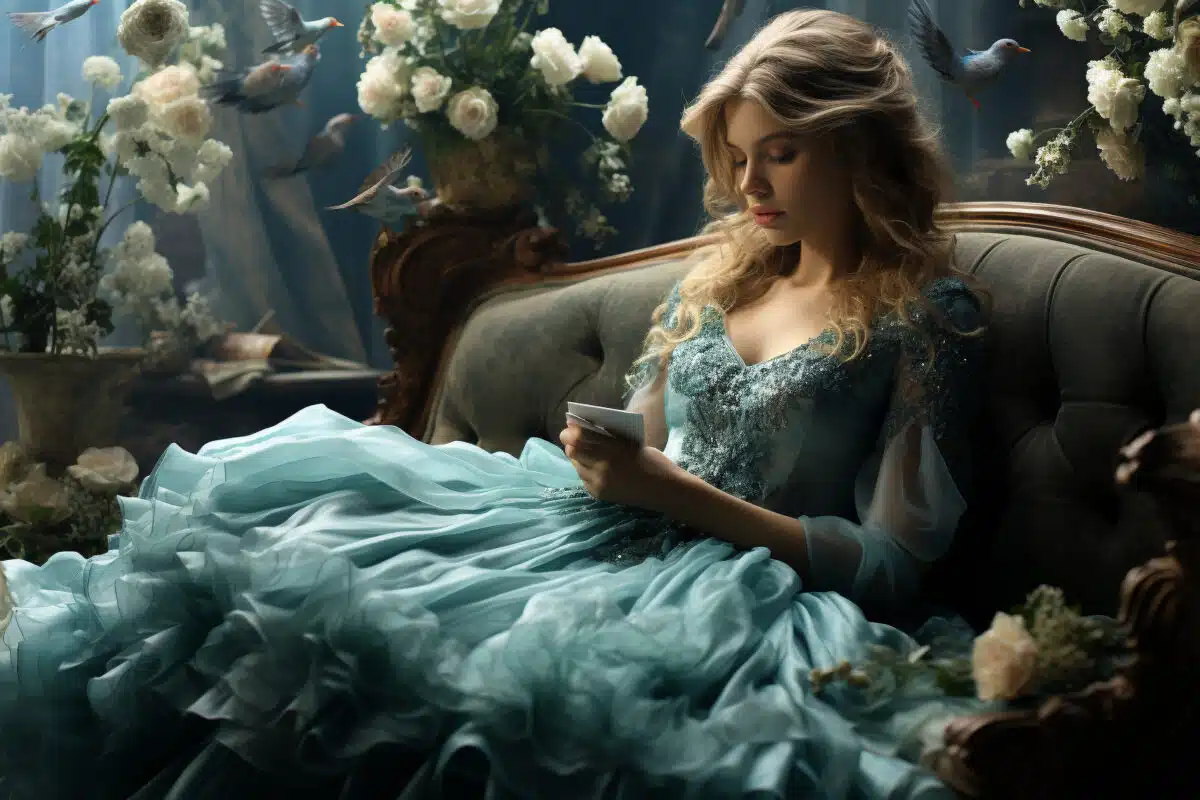
“De Days Dat Are Gone” by Claude McKay
I T’ink of childhood days again,
An’ wish dat I was free
To res’ me baby head once more
Upon me mudder’s knee:
If we had power to change dis life
An’ live it back again,
We would be children all de time
Nor fret at childhood’s pain.
I look on my school life of old,
Dem sweet days dat are pas’,
An’ wonder how I’d wish to see
Those dear times en’ at las’:
It was because I was a boy,
An’ knew not what b’en good;
All time I tas’e de supple-jack,
Bein’ I was so rude.
An’ o’ de marnings when I woke,
’Fo’ you can see you’ han’,
I mek me way on to de spring
Fe full me bucket-pan:
I t’ought ofttimes dat it was hard
For me to wake so soon;
Dere was no star fe light de way,
Much more de white roun’ moon.
Still, childhood pain could neber las’,
An’ i remember yet
De many sorrows ’cross me pat’
Dat neber mek me fret:
But now me joys are only few,
I live because I’m boun’,
An’ try fe mek my life of use
Though pain lie all aroun’.
“Nostalgia” by D. H. Lawrence (David Herbert Richards)
The waning moon looks upward; this grey night
Slopes round the heavens in one smooth curve
Of easy sailing; odd red wicks serve
To show where the ships at sea move out of sight.
The place is palpable me, for here I was born
Of this self-same darkness. Yet the shadowy house below
Is out of bounds, and only the old ghosts know
I have come, I feel them whimper in welcome, and mourn.
My father suddenly died in the harvesting corn
And the place is no longer ours. Watching, I hear
No sound from the strangers, the place is dark, and fear
Opens my eyes till the roots of my vision seems torn.
Can I go no nearer, never towards the door?
The ghosts and I we mourn together, and shrink
In the shadow of the cart-shed. Must we hover on the brink
Forever, and never enter the homestead any more?
Is it irrevocable? Can I really not go
Through the open yard-way? Can I not go past the sheds
And through to the mowie? – Only the dead in their beds
Can know the fearful anguish that this is so.
I kiss the stones, I kiss the moss on the wall,
And wish I could pass impregnate into the place.
I wish I could take it all in a last embrace.
I wish with my breast I here could annihilate it all.
“Thoughts of Home.” by Arthur Hugh Clough
I watched them from the window, thy children at their play,
And I thought of all my own dear friends, who were far, oh, far away,
And childish loves, and childish cares, and a child’s own buoyant gladness
Came gushing back again to me with a soft and solemn sadness;
And feelings frozen up full long, and thoughts of long ago,
Seemed to be thawing at my heart with a warm and sudden flow.
I looked upon thy children, and I thought of all and each,
Of my brother and my sister, and our rambles on the beach,
Of my mother’s gentle voice, and my mother’s beckoning hand,
And all the tales she used to tell of the far, far English land;
And the happy, happy evening hours, when I sat on my father’s knee,
Oh! many a wave is rolling now betwixt that seat and me!
And many a day has passed away since, I left them o’er the sea,
And I have lived a life since then of boyhood’s thoughtless glee;
Yet of the blessed times gone by not seldom would I dream,
And childhood’s joy, like faint far stars, in memory’s heaven would gleam,
And o’er the sea to those I loved my thoughts would often roam,
But never knew I until now the blessings of a home!
I used to think when I was there that my own true home was here,
But home is not in land or sky, but in those whom each holds dear.
The evening’s cooling breeze is fanning my temples now,
But then my frame was languid, and heated was my brow,
And I longed for England’s cool, and for England’s breezes then,
But now I would give full many a breeze to be back in the heat again.
But when cold strange looks without, and proud high thoughts within,
Are weaving round my heart the woof of selfishness and sin;
When self begins to roll a far, a worse and wider sea
Of careless and unloving thoughts between those friends and me,
I will think upon these moments, and call to mind the day
When I watched them from the window, thy children at their play.
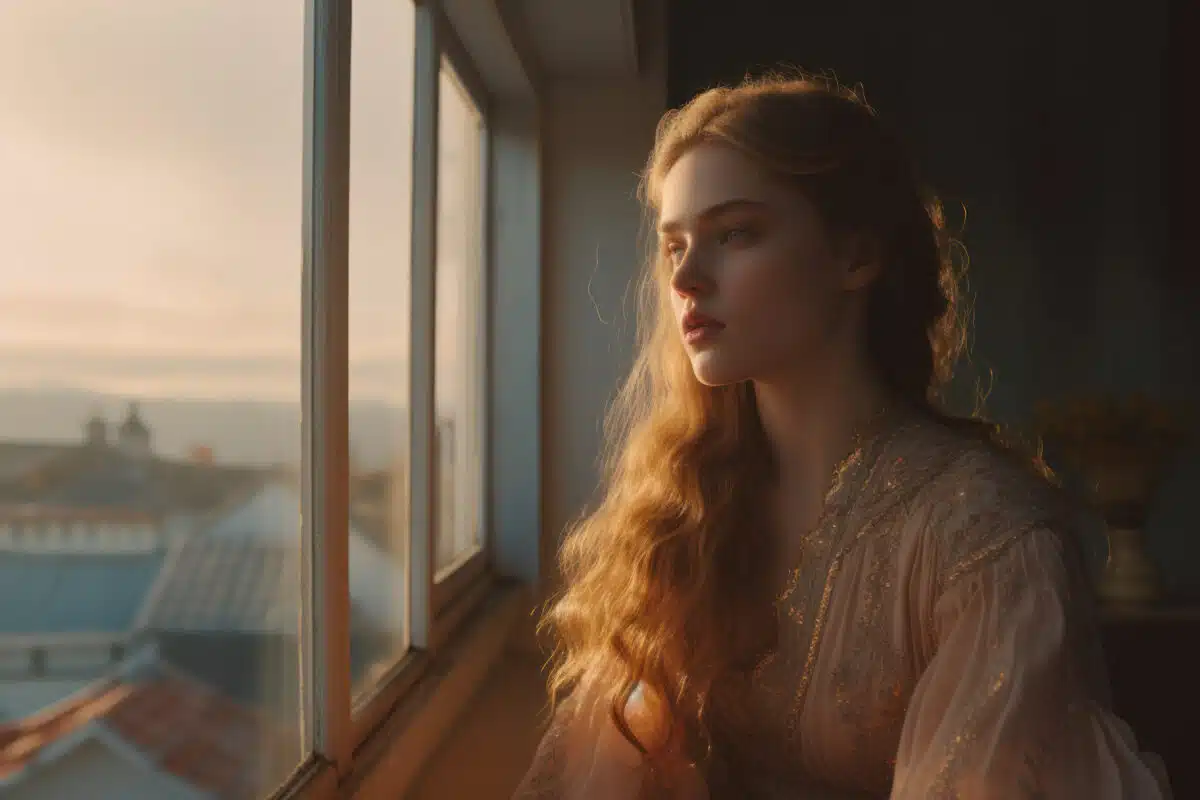
“Home Yearnings” by John Clare
O for that sweet, untroubled rest
That poets oft have sung!–
The babe upon its mother’s breast,
The bird upon its young,
The heart asleep without a pain–
When shall I know that sleep again?
When shall I be as I have been
Upon my mother’s breast–
Sweet Nature’s garb of verdant green
To woo to perfect rest–
Love in the meadow, field, and glen,
And in my native wilds again?
The sheep within the fallow field,
The herd upon the green,
The larks that in the thistle shield,
And pipe from morn to e’en–
O for the pasture, fields, and fen!
When shall I see such rest again?
I love the weeds along the fen,
More sweet than garden flowers,
For freedom haunts the humble glen
That blest my happiest hours.
Here prison injures health and me:
I love sweet freedom and the free.
The crows upon the swelling hills,
The cows upon the lea,
Sheep feeding by the pasture rills,
Are ever dear to me,
Because sweet freedom is their mate,
While I am lone and desolate.
I loved the winds when I was young,
When life was dear to me;
I loved the song which Nature sung,
Endearing liberty;
I loved the wood, the vale, the stream,
For there my boyhood used to dream.
There even toil itself was play;
‘T was pleasure e’en to weep;
‘T was joy to think of dreams by day,
The beautiful of sleep.
When shall I see the wood and plain,
And dream those happy dreams again?
“The Songs of Home.” by George Pope Morris
Oh, sing once more those dear, familiar lays,
Whose gliding measure every bosom thrills,
And takes my heart back to the happy days
When first I sang them on my native hills!
With the fresh feelings of the olden times,
I hear them now upon a foreign shore–
The simple music and the artless rhymes!
Oh, sing those dear, familiar lays once more,
Those cheerful lays of other days–
Oh, sing those cheerful lays once more!
Oh, sing once more those joy-provoking strains,
Which, half forgotten, in my memory dwell;
They send the life-blood bounding thro’ my veins,
And linger round me like a fairy spell.
The songs of home are to the human heart
Far dearer than the notes that song-birds pour,
And of our very nature form a part:
Then sing those dear, familiar lays once more!
Those cheerful lays of other days–
Oh, sing those cheerful lays once more!
“My Childhood Home I See Again” by Abraham Lincoln
My childhood home I see again,
And sadden with the view;
And still, as memory crowds my brain,
There’s pleasure in it too.
O Memory! thou midway world
‘Twixt earth and paradise,
Where things decayed and loved ones lost
In dreamy shadows rise,
And, freed from all that’s earthly vile,
Seem hallowed, pure, and bright,
Like scenes in some enchanted isle
All bathed in liquid light.
As dusky mountains please the eye
When twilight chases day;
As bugle-notes that, passing by,
In distance die away;
As leaving some grand waterfall,
We, lingering, list its roar—
So memory will hallow all
We’ve known, but know no more.
Near twenty years have passed away
Since here I bid farewell
To woods and fields, and scenes of play,
And playmates loved so well.
Where many were, but few remain
Of old familiar things;
But seeing them, to mind again
The lost and absent brings.
The friends I left that parting day,
How changed, as time has sped!
Young childhood grown, strong manhood gray,
And half of all are dead.
I hear the loved survivors tell
How nought from death could save,
Till every sound appears a knell,
And every spot a grave.
I range the fields with pensive tread,
And pace the hollow rooms,
And feel (companion of the dead)
I’m living in the tombs.
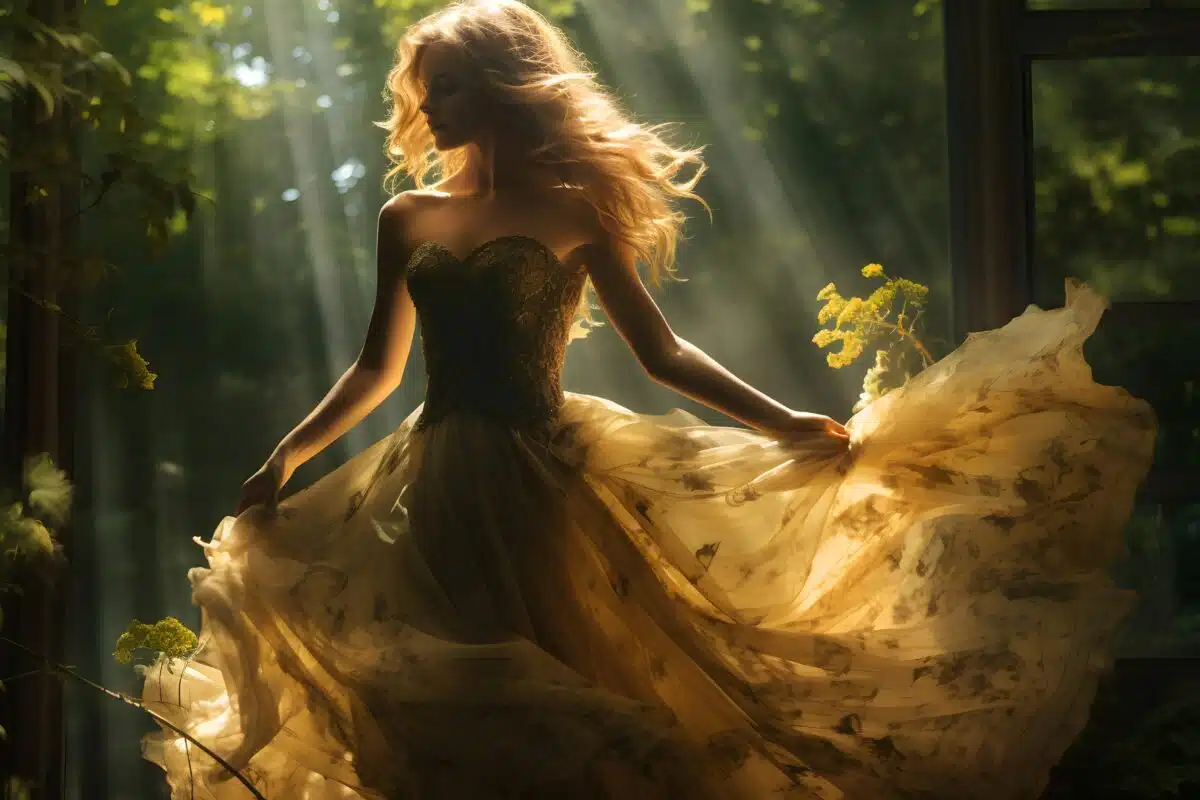
“Reminiscences Of A Dancing Man” by Thomas Hardy
I
Who now remembers Almack’s balls –
Willis’s sometime named –
In those two smooth-floored upper halls
For faded ones so famed?
Where as we trod to trilling sound
The fancied phantoms stood around,
Or joined us in the maze,
Of the powdered Dears from Georgian years,
Whose dust lay in sightless sealed-up biers,
The fairest of former days.
II
Who now remembers gay Cremorne,
And all its jaunty jills,
And those wild whirling figures born
Of Jullien’s grand quadrilles?
With hats on head and morning coats
There footed to his prancing notes
Our partner-girls and we;
And the gas-jets winked, and the lustres clinked,
And the platform throbbed as with arms enlinked
We moved to the minstrelsy.
III
Who now recalls those crowded rooms
Of old yclept “The Argyle,”
Where to the deep Drum-polka’s booms
We hopped in standard style?
Whither have danced those damsels now!
Is Death the partner who doth moue
Their wormy chaps and bare?
Do their spectres spin like sparks within
The smoky halls of the Prince of Sin
To a thunderous Jullien air?
“Right Here At Home.” by James Whitcomb Riley
Right here at home, boys, in old Hoosierdom,
Where strangers allus joke us when they come,
And brag o’ their old States and interprize –
Yit settle here; and ‘fore they realize,
They’re “hoosier” as the rest of us, and live
Right here at home, boys, with their past fergive!
Right here at home, boys, is the place, I guess,
Fer me and you and plain old happiness:
We hear the World’s lots grander – likely so, –
We’ll take the World’s word fer it and not go. –
We know its ways aint our ways – so we’ll stay
Right here at home, boys, where we know the way.
Right here at home, boys, where a well-to-do
Man’s plenty rich enough – and knows it, too,
And’s got a’ extry dollar, any time,
To boost a feller up ‘at wants to climb
And ‘s got the git-up in him to go in
And git there, like he purt’-nigh allus kin!
Right here at home, boys, is the place fer us! –
Where folks’ heart’s bigger ‘n their money-pu’s’;
And where a common feller’s jes as good
As ary other in the neighborhood:
The World at large don’t worry you and me
Right here at home, boys, where we ort to be!
Right here at home, boys – jes right where we air! –
Birds don’t sing any sweeter anywhere:
Grass don’t grow any greener’n she grows
Acrost the pastur’ where the old path goes, –
All things in ear-shot’s purty, er in sight,
Right here at home, boys, ef we size ’em right.
Right here at home, boys, where the old home-place
Is sacerd to us as our mother’s face,
Jes as we rickollect her, last she smiled
And kissed us – dyin’ so and rickonciled,
Seein’ us all at home here – none astray –
Right here at home, boys, where she sleeps to-day.
